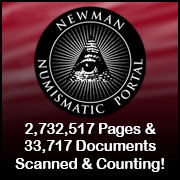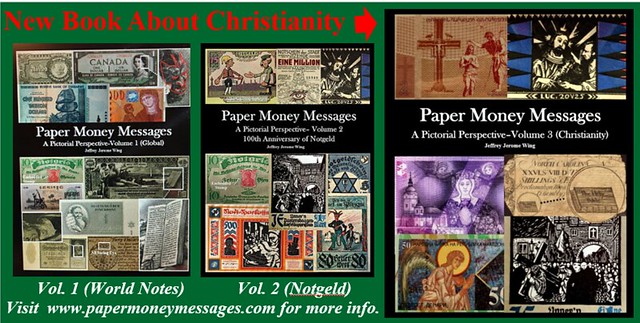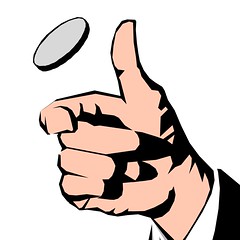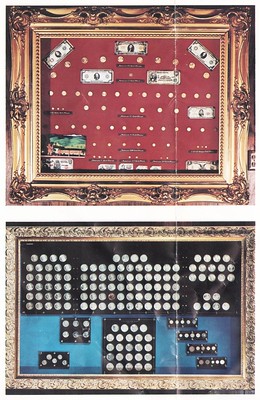
About UsThe Numismatic Bibliomania Society is a non-profit association devoted to the study and enjoyment of numismatic literature. For more information please see our web site at coinbooks.org SubscriptionsThose wishing to become new E-Sylum subscribers (or wishing to Unsubscribe) can go to the following web page link MembershipThere is a membership application available on the web site Membership Application To join, print the application and return it with your check to the address printed on the application. Print/Digital membership is $40 to addresses in the U.S., and $60 elsewhere. A digital-only membership is available for $25. For those without web access, write to: Charles Heck, Treasurer AsylumFor Asylum mailing address changes and other membership questions, contact Chuck at this email address: treasurer@coinbooks.org SubmissionsTo submit items for publication in The E-Sylum, write to the Editor at this address: whomren@gmail.com
BUY THE BOOK BEFORE THE COINSale Calendar
|
- WAYNE'S WORDS: THE E-SYLUM DECEMBER 1, 2019
- FAUVER TOKEN BOOKS OFFERED FOR SALE
- BANKNOTE BOOK HONG KONG CHAPTER PUBLISHED
- GOLD, SILVER AND GREENBACKS
- MARANVILLE COUNTERFEIT DETECTION DEVICES
- VIDEO: PATRICK RICHEY INTERVIEW
- AUDIO: COIN WORLD INTERVIEWS JOHN KRALJEVICH
- 1943 STEEL CENT PLANCHET STRIPS USED IN ROOFING
- QUERY: DEALER F.W. REID HONOLULU, HAWAII
- NOTES FROM E-SYLUM READERS: DECEMBER 1, 2019
- COL. GREEN'S 1838-O HALF DOLLARS
- COUNTERFEIT NUMISMATIC ITEM DONATIONS SOUGHT
- VOCABULARY TERM: LIMITING GUIDE
- FRANKLIN WALTER REID (1871-1937)
- CHICAGO HALL OF FAME INDUCTS CHARLES RICARD
- QUERY: BOISE, IDAHO ROYAL RESTAURANT COIN DISPLAY
- ERIC JORDAN ON KEY DATE MODERN U.S. COINS
- SELECTIONS FROM HOLABIRD DECEMBER 2019 SALES
- NUMISMATIC NUGGETS: DECEMBER 1, 2019
- ROYAL MINT UNVEILS ITS LARGEST COIN EVER
- COPERNICUS'S TREATISE ON MONEY
- LITHUANIA ISSUES VILNA GAON COMMEMORATIVE COIN
- EDWARD RUMSEY ROYAL ACADEMY OF ARTS GOLD MEDAL
- GEORGE WASHINGTON SILVER FUNERAL MEDAL
- GHANA ISSUES NEW BANKNOTES AND TWO CEDI COIN
- CHRISTINE LAGARDE SIGNS EURO BILLS
- BANKNOTE PRINTER DE LA RUE IN TROUBLE
- LATIN DICTIONARY COMPILERS REACH LETTER R
- LOOSE CHANGE: DECEMBER 1, 2019
- TIFFANY AND THE GREAT SEAL OF THE U.S.
- FEATURED WEB PAGE: COINS IN HONG KONG
Click here to access the complete archive
Click here to unsubscribe (scroll down)
To comment or submit articles, reply to whomren@gmail.com
Content presented in The E-Sylum is not necessarily researched or independently fact-checked, and views expressed do not necessarily represent those of the Numismatic Bibliomania Society.
WAYNE'S WORDS: THE E-SYLUM DECEMBER 1, 2019
 New subscribers this week include:
Doron Engel,
James Ricks,
and a number of NBS members who weren't already subscribed at the address on file with our Treasurer Chuck Heck.
Welcome aboard! We now have 6,063 subscribers.
New subscribers this week include:
Doron Engel,
James Ricks,
and a number of NBS members who weren't already subscribed at the address on file with our Treasurer Chuck Heck.
Welcome aboard! We now have 6,063 subscribers.
Thank you for reading The E-Sylum. If you enjoy it, please send me the email addresses of friends you think may enjoy it as well and I'll send them a subscription (but let me know if they are located in the European Union). Contact me at whomren@gmail.com anytime regarding your subscription, or questions, comments or suggestions about our content.
NBS Members: It's that time of year again - please renew your membership by check or online with Paypal. For more information, see:
https://www.coinbooks.org/about/
membership.html
This week we open with an offering of Ben Fauver's token books, one new paper money book, a book excerpt about Greenbacks in the U.S. West, and an update from the Newman Numismatic Portal.
Other topics this week include steel cent planchet strips, Honolulu dealer F. W. Reid, Charles Ricard, Col. Green's 1838-O half dollars, selections from the Holabird auctions, the Royal Mint's largest coin, and Tiffany's redesign of the Great Seal of the U.S.
To learn more about Kettle Pieces, game counters, jetons, Hong Kong coins and paper money, Harvey Maranville counterfeit detection devices, Dickin Medals for peacetime bravery and merit, Falun Gong overstamped notes, limiting guides, Carson City Mint ephemera, Copernicus's treatise on money, an electronic nose, and the flipistic singularity, read on. Have a great week, everyone!
Wayne Homren
Editor, The E-Sylum
FAUVER TOKEN BOOKS OFFERED FOR SALE
Lloyd Wagner writes:
I recently purchased the entire collection of the late L. Benjamin Fauver, including his book inventory. He collected counters, spiel markes, and jetons, and authored books on the same. I would like to make his books available to collectors. I have multiple copies of each of the following:
Exonumia Symbolism & Classification
A Catalogue of Kettle Pieces and an Examination of the Symbolism and Classification of Kettle Pieces and of American Exonumia of the Hard Times, Compromise, and Civil War Periods.
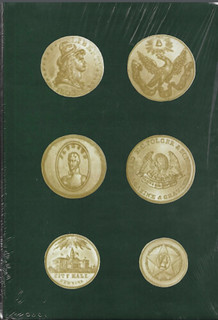
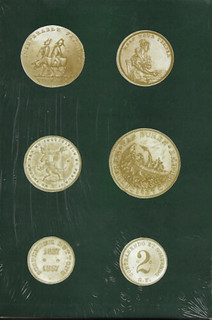
Published in 1982 by Oak Grove Publications and written by L. Benjamin Fauver, this 350-page hardbound book was written to fill three voids:
1. Current recognition and knowledge of the contemporary political significance of the many key symbols and legends which appear on Kettle pieces and on American exonumia of the Hard Times, Compromise, and Civil War periods.
2. Current understanding of the most probable use or uses to which individual varieties of exonumia were put with respect to these four series.
3. Current appreciation of political exonumia as historical documents worthy of study, not only by serious collectors, but also by historians.
Price: $30.00 each + $5.00 Shipping and Handling via USPS Media Mail to U.S. addresses
American Counters - Part 1 - Double Eagle and Eagle Gold
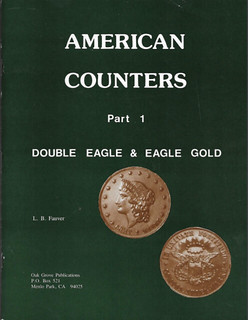
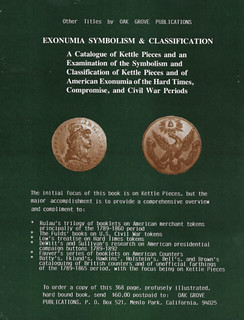
Published in 1983 by Oak Grove Publications and written by L. Benjamin Fauver, this 100 page soft-bound catalog details Double Eagle ($20, 34mm to 35mm) and Eagle ($10, 25mm to 29mm) sized counter tokens. A fascinating subset of exonumia collecting!
Note: Fauver published at least five more catalogs, including Half Eagle Gold (Part II), Three Dollar and Quarter Eagle Gold (Part III), One Dollar and One Dollar Silver (Part IV), Minor Denomination and Miscellaneous (Part V), and Early California Counters.
Price: Only $6.00 each + $3.50 Shipping and Handling via USPS Media Mail to U.S. addresses
Nuremberg and Nuremberg Style Jetons

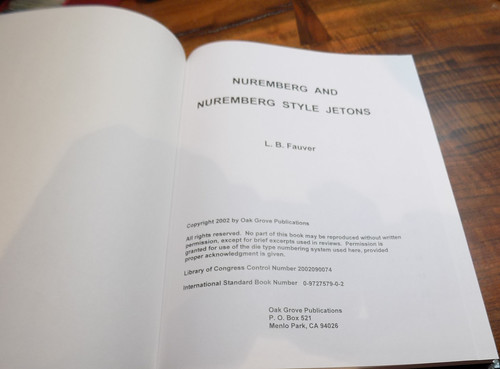
Published in 2002 by Oak Grove Publications and written by L. Benjamin Fauver, this 299-page hardbound book examines each of the five categories of Nuremberg and Nuremberg style jetons. Fauver examines the languages used on these tokens, helps the collector to determine if a specimen is a jeton, gives advice on how to use this catalogue, and examines alternative ways to collect these jetons. Nearly half of the jetons found in America originated in Nuremberg, Furth, and Vienna, making this reference work indispensable to the jeton collector.
Price: $75.00 each + $5.00 Shipping and Handling via USPS Media Mail to U.S. addresses
Lloyd adds:
Bundle price for all three books: $90.00 + $6.50 S&H via USPS Media Mail. I would also be willing to offer discounts on multiple items.
I have sold the Exonumia Symbolism & Classification books on eBay for $20 up to $127.50! The American Counters Part 1 books have sold for $3.75 to $36.00. I just received the Nuremberg and Nuremberg Style Jetons books, and have not sold any yet. A few are listed online for $150.
The books are new publisher's overstock. Exonumia Symbolism & Classification is in original shrinkwrap. Lloyd can be reached at thegardenerstouch@juno.com -Editor
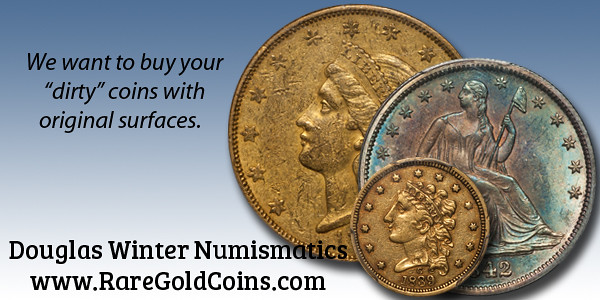
BANKNOTE BOOK HONG KONG CHAPTER PUBLISHED
Owen Linzmayer publishes The Banknote Book, a useful, constantly updated electronic reference. On November 29, 2019 he announced via email the availability of the chapter on the banknotes of Hong Kong. It's available for $9.99. -Editor
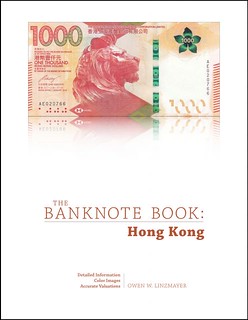 Here in the USA, yesterday we celebrated Thanksgiving, and in the spirit of the holiday, today we're giving thanks to all the subscribers and contributors who have supported our efforts to catalog the world's notes. We have a huge assortment of revisions this week, including the completion of the Hong Kong chapter with coverage of all issuers, the addition of the National Bank of Scotland coverage to the Scotland chapter, and a slew of new notes and updates for many other chapters.
Here in the USA, yesterday we celebrated Thanksgiving, and in the spirit of the holiday, today we're giving thanks to all the subscribers and contributors who have supported our efforts to catalog the world's notes. We have a huge assortment of revisions this week, including the completion of the Hong Kong chapter with coverage of all issuers, the addition of the National Bank of Scotland coverage to the Scotland chapter, and a slew of new notes and updates for many other chapters.
Hong Kong (East and Southeast Asia)
This 139-page catalog covers notes issued by the Oriental Bank, Oriental Bank Corporation, Chartered Mercantile Bank of India, London and China, Mercantile Bank of India, Mercantile Bank Limited, The Chartered Bank of India, Australia and China, The Chartered Bank, Standard Chartered Bank, Agra and United Service Bank, Bank of Hindustan, China and Japan, Asiatic Banking Corporation, Hong Kong and Shanghai Banking Company, Hong Kong and Shanghai Banking Corporation, Commercial Bank Corporation of India and the East, National Bank of China, Government of Hong Kong, and Bank of China. Revised 26.11.2019.
For more information on The Banknote Book, see:
http://www.banknotenews.com/banknote_book/banknote_book.php
GOLD, SILVER AND GREENBACKS
Pablo Hoffman passed along this interesting DelancyPlace excerpt from The Bonanza King by Gregory Crouch. We'd mentioned the book after it was published last year. -Editor
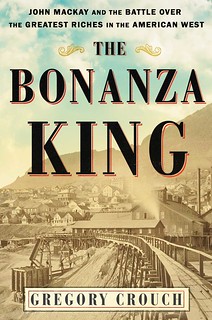 When the United States began issuing paper money in 1861 to pay for the Civil War, the notes were not trusted by Americans and were derided as "greenbacks" or "shinplasters." Only when the new federal income tax was instituted, and it became clear that greenbacks could be used to pay taxes, did their reputation and value improve. Gold and silver discovered in the West and shipped to the East, especially the output of Nevada's Comstock Lode, made a crucial difference in the war:
When the United States began issuing paper money in 1861 to pay for the Civil War, the notes were not trusted by Americans and were derided as "greenbacks" or "shinplasters." Only when the new federal income tax was instituted, and it became clear that greenbacks could be used to pay taxes, did their reputation and value improve. Gold and silver discovered in the West and shipped to the East, especially the output of Nevada's Comstock Lode, made a crucial difference in the war:
"The previous summer, the federal government's need for money to suppress the rebellion had forced it to issue paper 'demand notes' (theoretically redeemable for specie), followed by 'legal tender notes' or 'United States Notes' a true fiat currency unbacked by precious metal. These were nicknamed 'greenbacks' on account of the green ink used to print the reverse side of the notes, but Americans in the loyal eastern states didn't fully trust Lincoln's 'shinplasters,' as went the common nickname for paper money. Steady infusions of precious metal from the Pacific Slope to eastern financial institutions did much to soothe anxiety, buttress confidence, and keep the wheels of the Northern economy turning. As the New York Herald noted that summer, 'commerce rests ... on ... confidence.' The Herald considered it 'a matter of national importance that the silver mines in Nevada Territory be fully developed.'
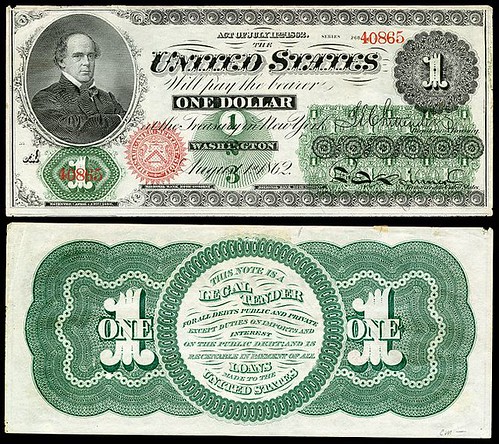
Image of one dollar "Greenback," first issued in 1862
"However, on the Pacific Coast, Californians and Nevadans universally reviled the federal greenbacks and tallied a black mark against the character of a person who tried to pass them off in normal business affairs. Greenbacks came into 'brisk demand' only later in the year -- people used them to pay the new federal income tax, the first ever levied from Washington, D.C. ...
"[By 1864, the war was still inconclusive, highly unpopular in certain Northern circles, and] the presidential election loomed over the battlefields. The Peace Democrats -- the 'Copperheads' -- running against Lincoln advocated putting an immediate end to the fighting and negotiating for the reformation of the Union behind the slogan 'The Union as it was, the Constitution as it is.' Since the seceded states rejected anything short of Southern independence, ballot box victory of the Democrats would partition the once United States. Union forces captured Atlanta in early September and sealed Lincoln's victory. Eight days before the election, Nevada became a state. Since the start of the Civil War, several million dollars of gold and silver mined in the West had left [the gold and silver mines of Nevada and other Western states for] San Francisco each month destined for eastern ports and cities, either as bullion or coin.
"A significant portion of that wealth had been raised from [Nevada's] Comstock Lode. Even though the federal greenbacks weren't backed by gold or silver, the steady infusions of western precious metals into eastern banks did much to bolster public confidence in the Northern economy and in the strength and durability of the federal government -- and those repositories of confidence were cornerstones of the Union war effort. Inflation did erode the value of the federal greenbacks as the war dragged on, but economic conditions were always much worse in the South. No metal at all backed the Confederate currency, and blockaded by the U.S. Navy, the South and its economy received no substantial gold or silver infusions throughout the entire course of the war. Southern economic confidence waned. The South had no Comstock Lode, and the increasingly powerful inflationary whirlwind that battered the rebel economy sapped the Confederacy's ability to wage war."
To read the complete article, see:
GOLD, SILVER, AND THE AMERICAN CIVIL WAR -- 11/25/19
(https://delanceyplace.com/view-archives.php?p=3981)
To read the earlier E-Sylum article, see:
NEW BOOK: THE BONANZA KING
(https://www.coinbooks.org/v21/esylum_v21n29a05.html)
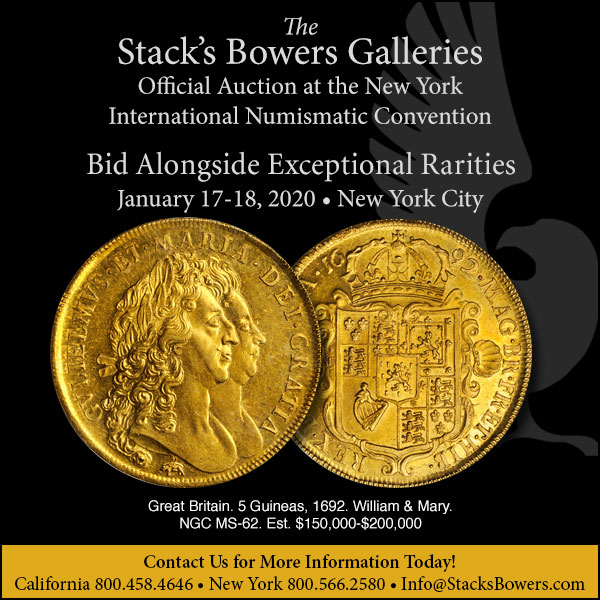
MARANVILLE COUNTERFEIT DETECTION DEVICES
The latest addition to the Newman Numismatic Portal is a set of papers on the Harvey Maranville counterfeit detection devices. Project Coordinator Len Augsburger provided the following report. -Editor
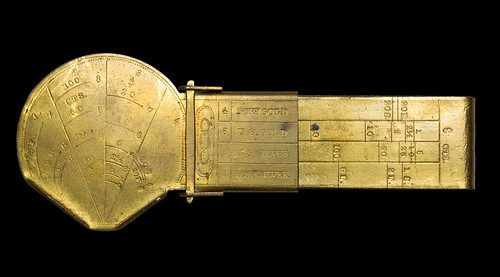
Newman Portal Adds Research on Maranville Counterfeit Detection Devices
Given Eric P. Newman's natural interest in all things mechanical (and numismatic), the publication of U.S. Coin Scales and Counterfeit Coin Detectors (co-authored with A. George Mallis) in 1999 was no surprise. This work focused on 19th century counterfeit detection devices patented and produced in the United States. Malcolm Mathias, an Australian collector, has now driven this work forward with a set of papers on the Harvey Maranville counterfeit detection devices patented in 1857, 1860, and 1878. Supported in part by a grant from the Eric P. Newman Numismatic Education Society, Mathias traveled extensively throughout the United States in search of Maranville examples to add to his census, and in addition visited related archives and institutions in search of background information on Maranville and his inventions. The result is what will be the definitive work on this topic for many years.
Image: 1857 Maranville Coin Tester, from the Eclectic Numismatic Treasure collection.
Link to Malcolm Mathias papers on Maranville counterfeit detectors:
https://nnp.wustl.edu/library/booksbyauthor/534837
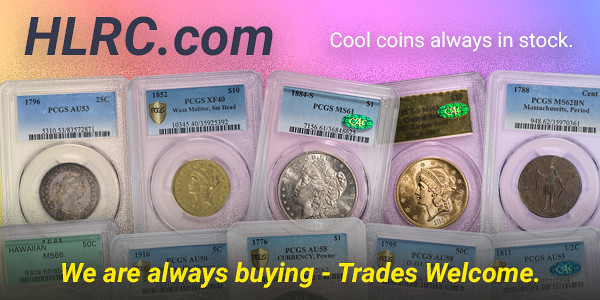
VIDEO: PATRICK RICHEY INTERVIEW
These are selections from the David Lisot Video Library that feature news and personalities from the world of coin collecting. David has been attending coin conventions since 1972 and began videotaping in 1985. The Newman Numismatic Portal now lists all David's videos on their website at:
https://nnp.wustl.edu/library/multimediadetail/522852
Here's an interview with Patrick Richey of World Numismatics LLC. -Editor
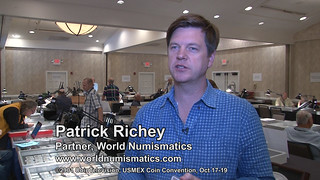 Patrick Richey, Partner, World Numismatics, David Lisot, Interviewer, CoinTelevision.com.
Patrick Richey, Partner, World Numismatics, David Lisot, Interviewer, CoinTelevision.com.
World Numismatics is a company that specializes in gem quality world coins. Patrick Richey is now a partner in the firm and shares about his interests in numismatics.
This video is a highlight from:
US Mexican Numismatic Association Convention Highlights 2019
An excerpt of the video is available for viewing on the Coin Television YouTube Channel at:
https://youtu.be/7q4lFm9XFDA
AUDIO: COIN WORLD INTERVIEWS JOHN KRALJEVICH
Earlier this week I listened to a new Coin World podcast where Chris Bulfinch and Jeff Starck interview John Kraljevich. Check it out. -Editor
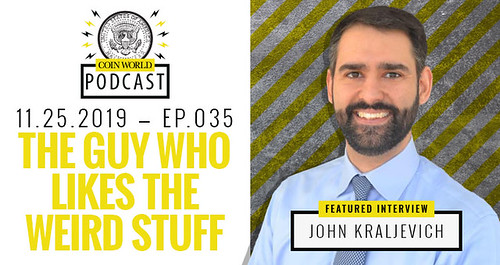
Jeff and Chris talk with John Kraljevich, an expert on early American coins and medals, whose auction catalogs are widely used as reference works. Their conversation covered quite a bit of ground, touching on themes ranging from the best way to write an auction catalog to the participation of young people in the hobby. They also discuss Chris' interesting family connection to the 1787 Columbia-Washington Medal.
To listen to the complete podcast, see:
https://www.coinworld.com/news/us-coins/cwpod_ep035
(https://www.coinworld.com/news/us-coins/cwpod_ep035)

1943 STEEL CENT PLANCHET STRIPS USED IN ROOFING
Tom DeLorey submitted this great background tale of the Denver-area afterlife of 1943 Steel Cent planchet strips. -Editor
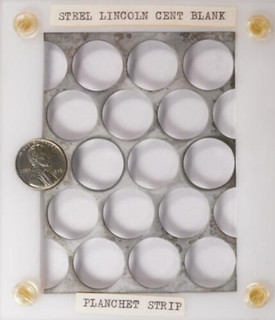
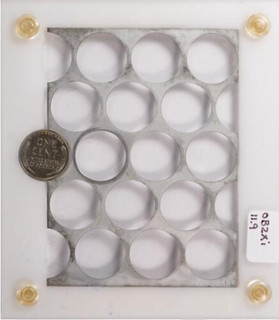
The recent issue illustrated a nice example of a piece of 1943 steel cent planchet strip. This part of the story concerning the strip is fairly well known, but just in case a few of your readers are unfamiliar with it I will tell it again.
Some time after I started working for ANACS in 1978, fellow Authenticator Ed Fleischmann showed me a similar piece of the webbing and told me that he had gotten it from a dealer up in Denver. The dealer told Ed that during World War Two when a lot of wartime housing was being built fast and cheap, some builders in Denver were forced to use substandard plywood for their roofs. To reinforce the roofs, certain builders nailed down long strips of the steel cent webbing that they got from the Denver Mint.
The Mint was getting its steel cent strip pre-galvanized and rolled from some steel mill. After it punched out the blanks, it had no facility to remelt the webbing into new strip, or galvanize it after they did. The one steel mill in Colorado, Colorado Foundry and Iron in Pueblo, allegedly did not want it as scrap steel because of the zinc galvanization. So, the Mint offered it for sale locally, the builders used it for roofing, and when the wartime housing started needing new roofs 30+ years later the re-roofers salvaged quantities of the webbing and sold it to coin dealers. The dealers cut it up and sold it as shown.
Often it is badly oxidized, but it can be reprocessed like the cents themselves. The longest piece I have ever seen was about five feet.
I was unfamiliar with this great story. Thanks! Stories of streets paved with gold are a dime a dozen, but a roof made of planchet strips? -Editor
To read the earlier E-Sylum article, see:
NUMISMATIC NUGGETS: NOVEMBER 24, 2019 : 1943 Steel Cent Planchet Strip
(https://www.coinbooks.org/v22/esylum_v22n47a16.html)
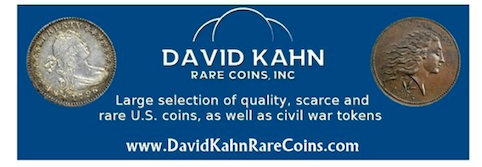
QUERY: DEALER F.W. REID HONOLULU, HAWAII
Michael Merrill has a question about a 1920s-era stamp and coin dealer from Hawaii. -Editor
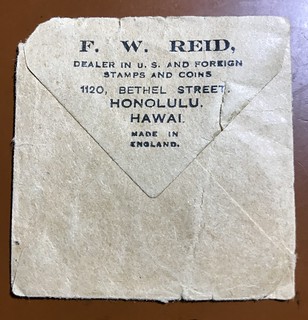 Rummaging through some accumulated coin stuff, I came across this interesting 2 1/4" coin envelope of yesteryear. I would be pleased to pass this on to the first respondent willing to dig up useful information about F. W. Reid.
Rummaging through some accumulated coin stuff, I came across this interesting 2 1/4" coin envelope of yesteryear. I would be pleased to pass this on to the first respondent willing to dig up useful information about F. W. Reid.
In the 1970's and early 80's coin dealer Bob Cohen, I believe originally from Maryland, moved to Hawaii and always made the long trek to the legendary coin shows at Lanham, MD.
It's hard to imagine what it was like doing business as a U.S. and foreign coin and stamp dealer in Honolulu in Reid's day, especially when he/she imported envelopes from England. Perhaps a U.K. expat?
A search on the Newman Numismatic Portal came up empty - it probably would have found something if Reid had advertised in the publications digitized there. Perhaps he was primarily a stamp dealer and was less active in coins.
A general web search found stamp dealers offering stamped envelopes with Reid's cachet mailed from Hawaii in August 1928 - these are First Day Covers for the Captain Cook Sesquicentennial. Reid also sold stamp books - Worthpoint lists a 1919 copy of A Check List of the Stamps of Hawaii - And More by Charles Foster Richards with a seller's stamp of "F.W. Reid Stamps and Coins, Hawaii Theatre, Honolulu, T.H."
I reached out to numismatic biographer John Lupia and he submitted an article on Reid which appears elsewhere in this issue. Can anyone else help? -Editor
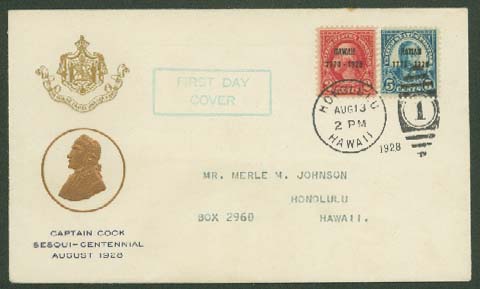
https://www.philbansner.com/postal-history-results.htm?group=50&pagenum=3&keyword1=1926-31+Issues
SCARCE BOOK—1916 RICHARDS HAWAIIAN POSTAGE STAMPS AND STAMPED ENVELOPES (https://www.worthpoint.com/worthopedia/scarce-book-1916-richards-hawaiian-238788491)
NOTES FROM E-SYLUM READERS: DECEMBER 1, 2019
Dickin Medals for Peacetime Bravery and Merit
Jim Duncan writes:
Congratulations to someone on creating a medal for animals similar to the Dickin Medal - which is "for gallantry - we also serve."
But they also have a pair of medals for peacetime bravery and merit - one gold (FOR ANIMAL GALLANTRY AND AND DEVOTION TO DUTY), one in silver (ORDER OF MERIT). I attach pics of all three.
A New Zealand fox terrier, George, recently earned the gold medal, and paid with his life, by protecting his young children friends from a Rottweiler which had evil intent.
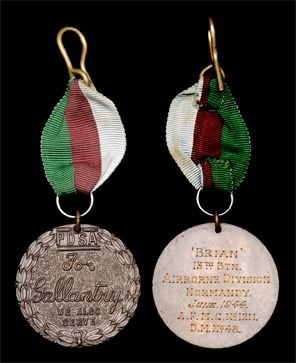
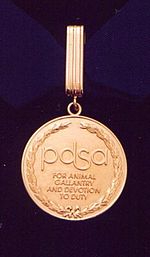
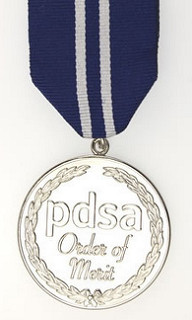
Thank you! -Editor
To read the earlier E-Sylum article, see:
ANIMALS MEDAL OF BRAVERY CREATED
(https://www.coinbooks.org/v22/esylum_v22n46a25.html)
Correction Corrected
Last week I mistakenly attributed a comment. It was Pabitra Saha who pointed out an error in the Liberia Doe coin. Sorry! We'll fix our online archive. -Editor
To read the earlier E-Sylum article, see:
NOTES FROM E-SYLUM READERS: NOVEMBER 24, 2019 : Correction: Liberia's Samuel Doe Served 1980-1990
(https://www.coinbooks.org/v22/esylum_v22n47a06.html)
Coin Toss Odds
Bruce H. Smith writes:
That coin toss at the Northeast Numismatics table may not have been a 50/50 proposition.
OK, math geeks - have fun with the 2009 article Bruce sent from the site of the Economics department of the University of California Santa Barbara. And remember, even a coin "fabricated perfectly, down to the last vigintillionth of a yoctometer... will land on its edge around 1 in 6000 throws, creating a flipistic singularity." -Editor
To read the complete article, see:
The Coin Flip: A Fundamentally Unfair Proposition?
(https://econ.ucsb.edu/~doug/240a/Coin%20Flip.htm)
To read the earlier E-Sylum article, see:
NOTES FROM E-SYLUM READERS: NOVEMBER 24, 2019 :
The Baltimore Coin Flip Deal
(https://www.coinbooks.org/v22/esylum_v22n47a06.html)
More on Book Preservation
George Kolbe writes:
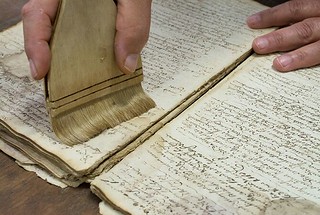 Good discussions on book preservation. Another consideration is the "wolf in sheep's clothing" factor. While the book-blocks of older publications may be relatively stable, their bindings are often teeming with chemical agents of destruction. Calf is a prime offender, often highly acidic (on the other end of the spectrum, vellum is relatively stable). Animal glue utilized to affix bindings is often harmful as well.
Good discussions on book preservation. Another consideration is the "wolf in sheep's clothing" factor. While the book-blocks of older publications may be relatively stable, their bindings are often teeming with chemical agents of destruction. Calf is a prime offender, often highly acidic (on the other end of the spectrum, vellum is relatively stable). Animal glue utilized to affix bindings is often harmful as well.
A note on recent books - When I published John Adams's work on American coin auction catalogues in 1982, acid-free paper was expensive and not widely used in book production. Nowadays, it is ubiquitous and the leather used, when so bound, routinely has been de-acidified.
Thanks. Glad to hear of additional recent improvements in the publishing world.
Alan Meghrig passed along this article on a machine for 'smelling' books for signs of degradation. -Editor
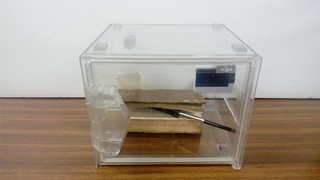 An "electronic nose" made up of sensors can detect the early signs of paper decomposition in books through the volatile organic compounds (VOCs) they emit.
An "electronic nose" made up of sensors can detect the early signs of paper decomposition in books through the volatile organic compounds (VOCs) they emit.
To test the sensor-based device, researchers from the University of Aveiro, Portugal, gathered 19 different books, all published between 1567 and 2016 and classified each by era, paper composition, condition and color.
Current methods for determining decay in books tend to be destructive, the research team said. The non-destructive technique using sensors to identify VOCs emitted from books could one day be used to preserve the books by identifying those in need of preservation.
To read the complete article, see:
Sensors sniff out decay in books old and new
(https://insights.globalspec.com/article/13002/sensors-sniff-out-decay-in-books-old-and-new)
To read the earlier E-Sylum article, see:
MORE ON SAFELY STORING BOOKS
(https://www.coinbooks.org/v22/esylum_v22n47a07.html)
Edward Everett's Gettysburg Address
Gil Parsons writes:
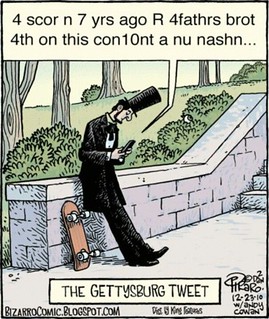 Let's see: Lincoln's Gettysburg Address: Gettysburg Rail Company Station 35 Carlisle St Gettysburg PA, track 2350 feet from station. Lincoln appears to have been a transient and lingered only 24 hours at this address, but was later spotted in various locations around Washington DC (!)
Let's see: Lincoln's Gettysburg Address: Gettysburg Rail Company Station 35 Carlisle St Gettysburg PA, track 2350 feet from station. Lincoln appears to have been a transient and lingered only 24 hours at this address, but was later spotted in various locations around Washington DC (!)
With reference to the recitation of Lincoln's Gettysburg speech, it would have been far more impressive if Steve Bishop had offered Edward Everett's Gettysburg Address. Everett's speech, which delighted the crowd, was almost two hours long, and yes, Everett did recite it from memory. I tried to buy the original printing of Everett's speech, but it proved much too expensive, largely because of the inclusion of another, rather briefer, set of remarks...
To read the earlier E-Sylum article, see:
WAYNE'S NUMISMATIC DIARY NOVEMBER 24, 2019 : Gettysburg Address
(https://www.coinbooks.org/v22/esylum_v22n47a17.html)
More Falun Gong Overstamped Chinese Banknotes
Jim Contursi passed along images of more Falun Gong overstamped notes. Thanks! -Editor
Here are a few more Falun Gong overstamped notes, which may be of interest to E-Sylum readers, even though the translations may not be spot on. My friend got them in change during an extended trip to China.
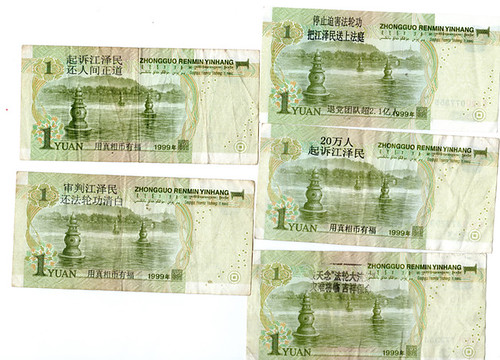
1) Try Jiang Zemin, the Falun Gong is innocent.
2) Stop persecuting the Falun Gong and bring Jiang Zemin to trial.
3) 200,000 people are bringing a law suit against Jiang Zemin.
4) Respect the "Falun Dafa," when disaster comes you will be protected.
5) Prosecute Jiang Zemin and return to the right path.
To read the earlier E-Sylum article, see:
CHINESE RUN FROM FALUN GONG OVERSTAMPED NOTE
(https://www.coinbooks.org/v22/esylum_v22n47a22.html)
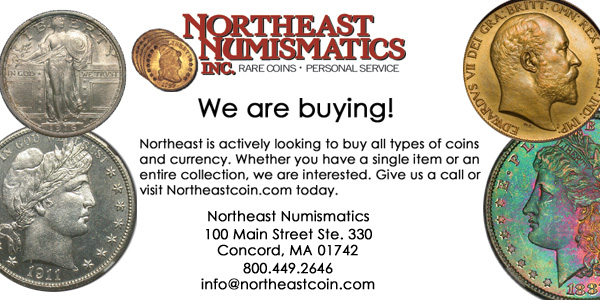
COL. GREEN'S 1838-O HALF DOLLARS
Saul Teichman submitted these notes and questions on the 1838-O half dollar. Thanks. -Editor
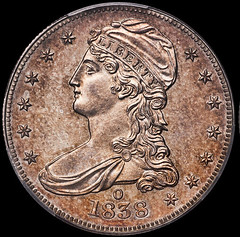 With regard to the 1838-O half dollar discussion in The E-Sylum, does anyone know where Breen got the idea that Col. Green owned seven 1838-O half dollars?
With regard to the 1838-O half dollar discussion in The E-Sylum, does anyone know where Breen got the idea that Col. Green owned seven 1838-O half dollars?
I went through the Newman appraisal when it was last offered and only found three.
I also went through the Newman portal and also found only three - 1 graded XF and two in Unc at the link below:
https://archive.org/details/colgreenestate1941newmanjohnson/page/n5
there is also a document with Newman's handwritten notes at the link below and it too only had three 1838-Os - one Proof, one Proof with slight edge dent and one in VF.
https://archive.org/details/newmanviewingnotes1940newmanjohnson/page/n33
It appears that the pedigree information for several of these is not really accurate and needs to be reassessed.
I am hoping that one day, we can get a copy of the Col Green appraisal on the Newman portal. If so, I will create summaries like I did for the Brand journals for his US rarities, patterns etc and we will get more accurate information out to the collecting fraternity.
Dave Stone of Heritage adds:
In his proof Encyclopedia, page 233, Breen says Wayte Raymond told him Col. Green owned seven examples of the 1838-O, so I guess that was his source for the inflated total. I agree with your findings, that he only owned three. It would be great to have the Green appraisal on the Newman Portal!
To read the earlier E-Sylum article, see:
COX 1838-O HALF DOLLAR FINDS NEW HOME
(https://www.coinbooks.org/v22/esylum_v22n47a13.html)
COUNTERFEIT NUMISMATIC ITEM DONATIONS SOUGHT
Doug Davis of the Numismatic Crime Information Center (NCIC) and the Anti-Counterfeiting Educational Foundation (ACEF) is seeking donations of counterfeit numismatic items for law enforcement education. -Editor
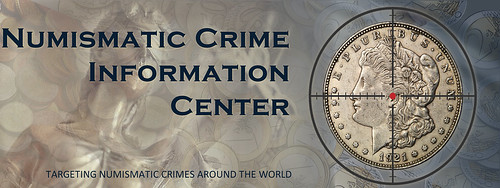
NCIC/ACEF is currently looking for counterfeit examples of the following :
Silver and Gold Eagles
Boxed Silver and Gold Eagles (Unc, Proof,Boxes and Certificates)
US Mint product counterfeits
Carded gold/silver from any Mint (Pamps etc.,)
Silver rounds, bars etc.,
Numismatic Coins any denomination raw or slabbed
Counterfeit slabs PCGS/NGC
Donated examples will be used for Law Enforcement training programs.
Send To:
NCIC
P.O. Box 14080
Arlington, Texas 76094
For more information on the Anti-Counterfeiting Educational Foundation, see:
https://acefonline.org/
For more information on the Numismatic Crime Information Center, see:
http://numismaticcrimes.org/
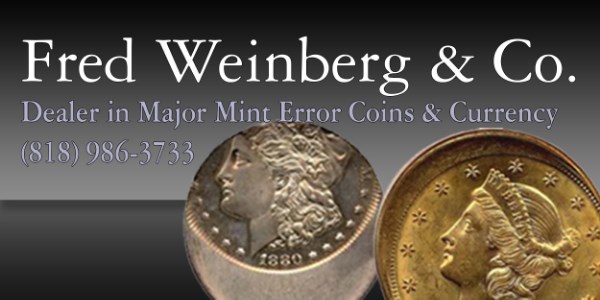
VOCABULARY TERM: LIMITING GUIDE
Dick Johnson submitted this entry from his Encyclopedia of Coin and Medal Terminology. Thanks! I added an image from the Stack's Bowers site. -Editor
Limiting Guide. A design element on a medallic piece to position additional work, as the focus to drill a hole, or for piercing; to affix a foot or hanger; to apply a jewel or appliqué, or such.
A few 19th century medals had tiny raised circles as limiting guides or piercing guides for drilling a hole at the 12:00 position just inside the rim. These can be found on several early U.S. Mint Indian Peace Medals, including James Madison (IP-5) and John Tyler (IP-21) Indian Peace Medals. Also a number of hand engraved medals by J.E. Eyman for the American Methodism Centenary, 1866, had limiting guides, some on both sides.
Limiting guides disappear if the hole drilled is larger than the diameter of the circle. However some specimens are found intact without the hole drilled. Hence they indicate a scarce variety of the piece since most such medals were intended to be issued holed (and usually are so). The raised circle's shape is called an annulet (but "limiting guide" when intended to have some further work done).
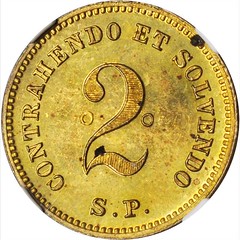 Another interesting example is the enigmatic diestruck token collectors call Contrahendo et Solvendo (Rulau Y3). It bears limiting guides, on either side of a large 2. It is speculated the pieces are intended to be suspender buttons and the two holes are for sewing to a garment!
Another interesting example is the enigmatic diestruck token collectors call Contrahendo et Solvendo (Rulau Y3). It bears limiting guides, on either side of a large 2. It is speculated the pieces are intended to be suspender buttons and the two holes are for sewing to a garment!
Sometimes an incuse limiting guide was employed, as where a gemstone was to be set in. An example is the American Numismatic Association Chicago Convention Medal of 1966, where a diamond was inset. Limiting guides found on the reverse of a uniface piece generally indicate some form of mounting to be attached. Paperweight plaquettes with half ball feet frequently had limiting guides struck as raised circles where the feet were to be attached. The hemisphere fits within the raised circle, which acted as a tiny fence around the feet.
In very rare instances the diesinker or medal designer would allow for spacing in the legend near the rim (without the limiting guide). An example is a Stephen A. Douglas Medal of 1866; the word monument contained space indicating where a hole is to be drilled, thusly: monu [space] ment. Reference:
{1999} Rulau (Russell) Standard Catalog of United States Tokens, 1700-1900, p 321-322.
Linear Circle. A raised line forming a circle as part of the design, an annulus. It can be part of the border – as one of several elements of the border design – or such a circle appearing anywhere in the design, often where it encloses a panel, or a center circle enclosing the device. When the circle is part of the border it is called the outer circlet, when it encloses a smaller center area it is called an inner circlet (or tressure if other than circular shape). Linear circles are often placed in a design where a badge center or center emblem is to be placed for a fabricated medal. Once this is added to the base medal the linear circle forms a frame for the center emblem. A small ring or circle in a design is called an ANNULET, an example of which is a limiting guide, the focus where a hole is to be drilled. A raised line that is not a circle but outlines the area for later engraving, for instance, is called a CARTOUCHE. See also border.
CLASS 02.5
4413-(015)02.12
Image from Stack's Bowers:
Looking for the meaning of a numismatic word, or the description of a term? Try the Newman Numismatic Portal's Numismatic Dictionary at: https://nnp.wustl.edu/library/dictionary
Or if you would like a printed copy of the complete Encyclopedia, it is available. There are 1,854 terms, on 678 pages, in The Encyclopedia of Coin and Medal Technology. Even running two a week would require more than 19 years to publish them all. If you would like an advance draft of this vital reference work it may be obtained from the author for your check of $50 sent postpaid. Dick Johnson, 139 Thompson Drive, Torrington, CT 06790.
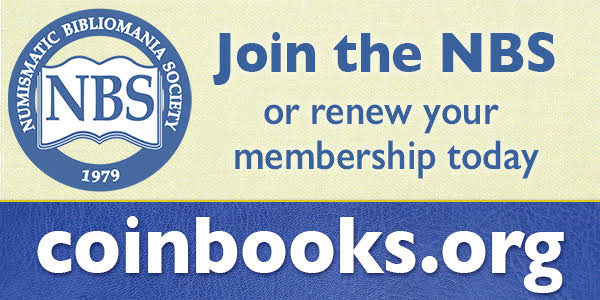
FRANKLIN WALTER REID (1871-1937)
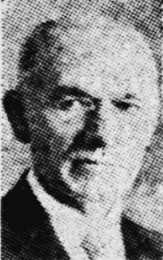 Franklin Walter Reid (1871-1937) was born in New York City, New York. He was
trained as a violinist and became a traveling musician, and was also trained as a
jeweler and worked for Tiffany and Company, New York.
Franklin Walter Reid (1871-1937) was born in New York City, New York. He was
trained as a violinist and became a traveling musician, and was also trained as a
jeweler and worked for Tiffany and Company, New York.
As a violinist he followed his career to Oregon, California, and Arizona.
His stamp and coin business took him to Australia, Colorado, and New York.
In 1917, he worked in Sydney, Australia as a jeweler and operated his own stamp and coin business.
In 1924, he moved to Honolulu, Hawaii and joined of the newly formed Honolulu Symphony Orchestra.
He joined the Hawaiian Philatelic Society, and the American Stamp Dealers Association.
He was an advertiser in Stamps, A Weekly Magazine of Philately, in the 1930's.
He was also a member of the Knights of Pythias, Masons, and Woodmen of the World.
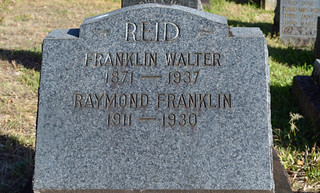 He died at his home 446 Olohanna, on Friday night, October 29, 1937 and is buried
in Nuuanu Cemetery, Honolulu, Hawaii. His wife Elizabeth survived him.
He died at his home 446 Olohanna, on Friday night, October 29, 1937 and is buried
in Nuuanu Cemetery, Honolulu, Hawaii. His wife Elizabeth survived him.
Bibliography :
Honolulu Star-Bulletin, Saturday, October 30, 1937, page 7 obit
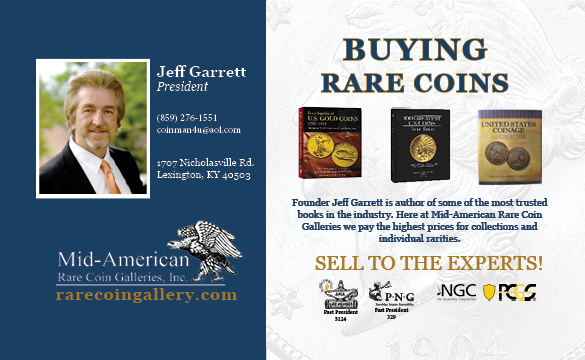
CHICAGO HALL OF FAME INDUCTS CHARLES RICARD
The Chicago Coin Club has announced the twelfth inductee into its Hall of Fame. -Editor
The Chicago Coin Club announces that the final person to be inducted into its Hall of Fame in 2019 is Napoleon medal specialist and hobby leader Charles J. (Charlie) Ricard. His Hall of Fame citation has been published on the club's Hall of Fame web page, www.chicagocoinclub.org/projects/hof.
Twelve Hall of Fame inductees were selected to commemorate the Chicago Coin Club's centennial year, 2019. However, additions may be made from time to time.
The Chicago Coin Club was organized in 1912 as American Numismatic Association Branch No. 1, and reorganized under its present name in 1919. All are invited to join. To become a member you must attend a meeting and submit an application along with a membership fee of $20 ($10 for Junior membership). A first reading of your application will be held at this meeting, and a second reading at the next monthly meeting, following publication of your name in the club newsletter. (You are not required to be present for the second reading.) Upon membership approval, you will become a member.
The Chicago Coin Club holds monthly meetings in downtown Chicago, plus at major numismatic conventions such as Central States, with a speaker featured at every meeting except the annual auction, held at the November meeting.
Here is the text of the Charles Ricard entry. -Editor
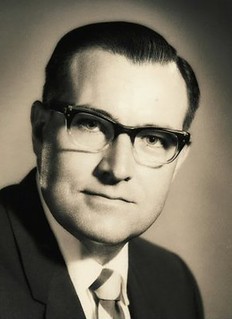 After moving to Northbrook late in 1962 to accept the position of auditor of Chicago's Lakeshore National Bank, Rochester (New York) native Charles J. (Charlie) Ricard joined the Chicago Coin Club Jan. 9, 1963 as member No. 766; he remained a member for over half a century. Mr. Ricard served as Financial Chairman for the 1966 ANA Convention in Chicago, personally handling over $100,000 in bourse fees, etc. That year, the Club awarded him its Medal of Merit. From 1987-88 he was President, and in 1989 he received a Literary Award and a Second Place Cabeen Exhibit Award, for his exhibits at meetings (including an original Castorland medal in silver). At the 2011 ANA World's Fair of Money, hosted by the Chicago Coin Club, he was recognized as Honorary General Chairman.
After moving to Northbrook late in 1962 to accept the position of auditor of Chicago's Lakeshore National Bank, Rochester (New York) native Charles J. (Charlie) Ricard joined the Chicago Coin Club Jan. 9, 1963 as member No. 766; he remained a member for over half a century. Mr. Ricard served as Financial Chairman for the 1966 ANA Convention in Chicago, personally handling over $100,000 in bourse fees, etc. That year, the Club awarded him its Medal of Merit. From 1987-88 he was President, and in 1989 he received a Literary Award and a Second Place Cabeen Exhibit Award, for his exhibits at meetings (including an original Castorland medal in silver). At the 2011 ANA World's Fair of Money, hosted by the Chicago Coin Club, he was recognized as Honorary General Chairman.
Mr. Ricard (March 19, 1930 - August 14, 2017) served in the U.S. Army Finance Corps 1951-53, then used the G.I. Bill to attend the University of Rochester. But he could not afford to go full time, and attended night school for six years; at the time of his move to the Chicago area, he was still lacking some credits. However, he was able to arrange to take night courses at Northwestern and DePaul and have the University of Rochester accept them, completing his B.S. degree in 1964 from the University's Simon School of Business with majors in history and classics. A lifelong bank auditor, he worked for the Marine Midland Bank in Rochester before moving to Illinois, then joined the First National Bank of Chicago as Assistant Vice President in their Trust Audit Unit in 1969; he retired from a successor bank in 1995. He became a Chartered Bank Auditor and a Certified Internal Auditor.
In 1947 he began attending meetings of the Rochester Numismatic Association, joining the following year. Throughout the 1940s and 1950s, he presented many programs and exhibits, and was club President 1959-61. Though he had wide interests in U.S. coins, he was most known for his collection of Napoleonic medals. He published a number of articles, primarily on medals, one garnering a Third Place Heath Literary Award, and placed award-winning exhibits of medals at conventions, receiving a First Place at the 1962 Detroit ANA. He served on the 1965 Assay Commission and in 1966 lectured at the Roosevelt University, Chicago, course in numismatics.
A willing worker, Mr. Ricard served as President of five numismatic organizations and Vice President of a sixth. As Chairman of the ANA's 1891 Club 1990-91, he attracted over 800 member-donors. He was elected a Numismatic News Ambassador in 1987. The ANA awarded him its Medal of Merit in 1991, the Glenn Smedley Memorial Award in 1993, a Presidential Award in 1994, the Lifetime Achievement Award in 1996, and the Farran Zerbe Award in 2003 – the last also honoring his great-grandfather, J.C. Lighthouse (ANA Governor 1904-07), and his uncle, Charles N. Ricard (President of the Cleveland Coin Club and a founder of the Token and Medal Society). The Rochester Numismatic Association named its speaker's medal for him.
Numismatic literature dealer George Kolbe, who knew him well, recalled him as "a gentleman of the old school. His love of numismatics and its literature was infectious and enduring."
To read the complete article, see:
Hall of Fame
– Chicago Coin Club –
Member 12
Charles J. Ricard
(http://www.chicagocoinclub.org/projects/hof/m12.html)
To read the earlier E-Sylum article, see:
CHICAGO HALL OF FAME INDUCTS HARRY FLOWER
(https://www.coinbooks.org/v22/esylum_v22n43a13.html)
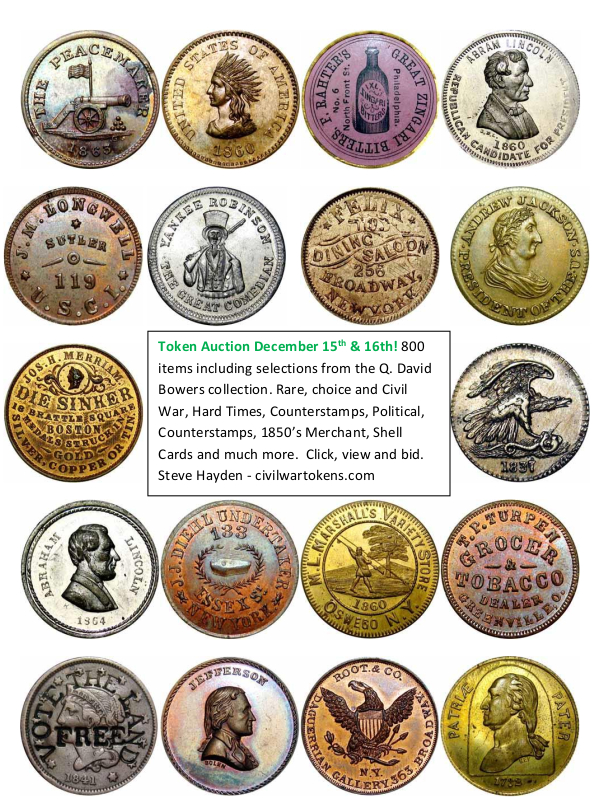
QUERY: BOISE, IDAHO ROYAL RESTAURANT COIN DISPLAY
"I'm attaching images of a brochure that was included in a lot of coin books and ephemera that I picked up on eBay. It's for a restaurant in Boise, Idaho that had large displays of coins and notes, the former mounted in Capital Plastics holders. From the coin prices listed, I'd say that this piece dates to the early-mid 1960s.
"A brief Google search suggests that the Royal Restaurant at 1112 Main Street no longer exists. I wonder what happened to all that loot."
Interesting - I'd never heard of this coin display before. Can any of our readers help? Where did the coins go when the display was dismounted? The owners are listed as Ed Graves and Vince Aguirre. The Newman Numismatic Portal turned up just one reference, a March 19, 1969 Coin World article (p12). -Editor
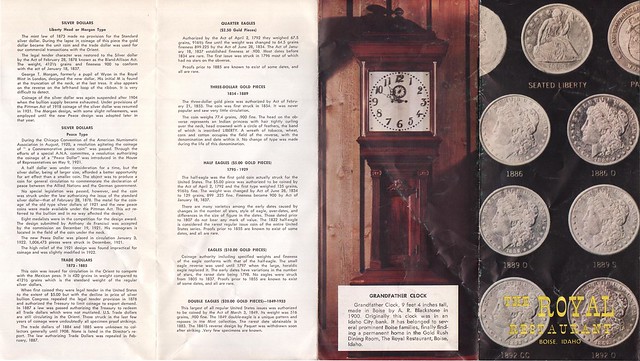
Coin brochure - outside spread
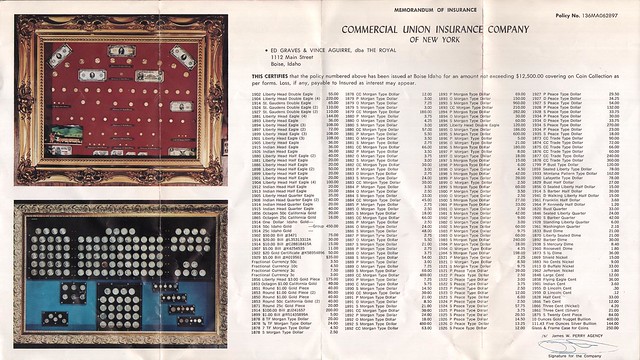
Coin brochure - inside spread
THE BOOK BAZARRE
ERIC JORDAN ON KEY DATE MODERN U.S. COINS
In an article published this week on Coin Update, Lou Golino interviews author Eric Jordan. Here's an excerpt - be sure to read the complete article online. -Editor
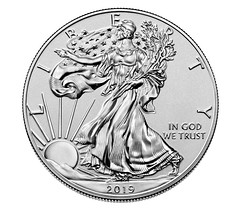 Eric Jordan, who has degrees in engineering and business, started as a collector of classic American issues like Prooflike Morgan dollars in the 1980s, but in the 1990s discovered he would not be able to complete that set and that indexed to inflation his collection had "leveled out or worse." His attention then shifted to "the radical drop in high-end modern coin mintages" and the "low-risk opportunity they presented," as he wrote in his well-received book, Modern Commemorative Coins (Krause, 2010). Later he co-authored with longtime dealer John Maben Top 50 Most Popular Modern Coins (Krause, 2012), which extended the analysis to coins issued after the publication of the first book and included updated mintage data.
Eric Jordan, who has degrees in engineering and business, started as a collector of classic American issues like Prooflike Morgan dollars in the 1980s, but in the 1990s discovered he would not be able to complete that set and that indexed to inflation his collection had "leveled out or worse." His attention then shifted to "the radical drop in high-end modern coin mintages" and the "low-risk opportunity they presented," as he wrote in his well-received book, Modern Commemorative Coins (Krause, 2010). Later he co-authored with longtime dealer John Maben Top 50 Most Popular Modern Coins (Krause, 2012), which extended the analysis to coins issued after the publication of the first book and included updated mintage data.
Eric's key argument in these books is that the potential appreciation of most coin series comes mainly from their key and semi-key dates with the rest of the series mostly along for the ride from an investing perspective. Mature, classic U.S. coin series' key and semi-key dates have had a long time to appreciate to the point that the average collector can only afford them in low grades, if at all. As for modern coins, "Today's key date moderns are displaying exactly the same behavior but are still affordable to the broad middle class," as he said in a 2012 Numismatic News article.
His response to the frequently mentioned argument that modern coins have been poor investments is to focus on the key dates in series' whose overall populations are increasing, not the common coins, and that many collectors are impatient and do not give the key coins' value enough time to appreciate. As he noted in that 2012 piece, "All one needs to do is focus on low population attractive issues in series with rapidly expanding total populations just as collectors with foresight have for generations."
It is true that both of Eric's books were written at a time when interest in U.S. Mint precious metal issues was higher than it is today and that classic and modern key dates have seen their values come down as the overall coin market has softened, but the basic approach is still valid. For example, prices for the 1995-W Proof Silver Eagle have come down, especially for graded 70s, but that coin is still worth more than the rest of the series combined for ungraded examples and 69's [or was until the 2019-S Enhanced Reverse Proof (ERP) was issued on November 14]. For graded examples, the story is different because of advancements in minting technology. MS-70 examples of the earlier dates that are very common below that grade are very scarce and expensive in the top grade (unlike recent issues that have almost no premium in MS-70).
Eric was also the first analyst to compare the American Silver Eagle to the Morgan silver dollar in his books and articles — a comparison that other writers have picked up on. I recently interviewed him about his arguments about key date coins; how the new reverse design the Mint plans to launch in 2021 and the issuance of the 2019-S ERP, the new king of Silver Eagles, will impact the series; and how he expects that coin and its cousin, the 1995-W Proof, to perform over time.
To read the complete article, see:
Key date coins, the 2019-S Enhanced Reverse Proof, and the future of American Silver Eagles: An interview with Eric Jordan
(http://news.coinupdate.com/key-date-coins-the-2019-s-enhanced-reverse-proof-and-the-future-of-american-silver-eagles-an-interview-with-eric-jordan/)
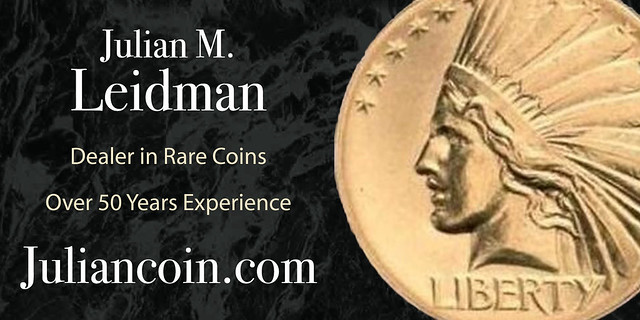
SELECTIONS FROM HOLABIRD DECEMBER 2019 SALES
Here are some items that caught my eye in the upcoming Holabird sale. -Editor
Lot 1633: Palace Mills 50 Cent Scrip Note
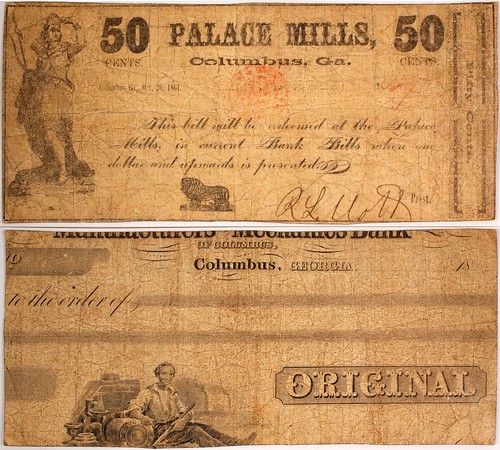
PMG Fine 12. Drawn on M & M Bank, Columbus, Georgia. The note is printed on a Mechanics Bank remainder. (1724443-005) State: Georgia City: Columbus Date: 1861
Civil War scrip is a fun area to collect. A number of notes, particularly in the South where resources were scarce, were printed on whatever paper could be found at the time. -Editor
To read the complete lot description, see:
Palace Mills 50 cent Note #58026
(https://holabirdamericana.liveauctiongroup.com/Palace-Mills-50-cent-Note-58026_i35011478)
Lot 1641: Carson City Mint Ephemera Collection
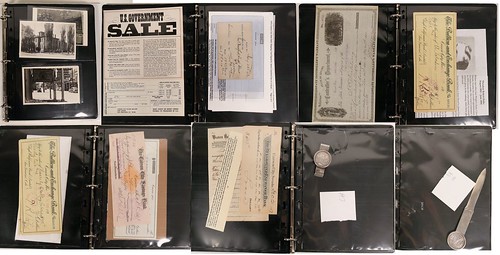
A folio of artifacts pertaining to the Carson City Mint, which operated from 1870-1893.
1) A sterling silver letter opener featuring an 1891-CC Morgan dollar, engraved "E. W. M." 7 1/2 inches long.
2) Sterling silver money clip with an 1891-CC Morgan dollar, engraved "NAPCO / RENO", on the reverse and stamped "The Westerner / Reno Nevada / Sterling on the front. 3 inches long.
'3) Fourteen vintage post cards including RPCs of the Mint Building, Virginia City street scenes, bullion shipments, coin press number "1", loading ore at Tonopah.
4) The original application and flyer for the GSA sale of Carson City Silver Dollars which occurred in the 1970s.
5) 1876 Carson City Mint bullion shipping card signed by Superintendent of the Mint James Crawford, receiving 17 bars of silver from California Bullion weighing 1967 1/2 pounds with a value of $75,010 (at $2 an ounce). 3 x 5 inches, with a hole. Crawford was director of the Mint for ten years, from 1874-1885.
6) State Controller's Warrant dated 1886 with mining vignette, issued as salary to the mint assayer.
7) Nineteen checks signed by Theodore Robert Hofer, the seventh superintendent at the Carson City Mint from 1892-1894. The checks were drawn on The Bullion and Exchange Bank of Carson City, where Hofer also worked.
8) two items from the Carson City Savings Bank, an issued check dated October 8, 1878, and an unissued promissory note payable in gold coin of the United States of America at their office in Carson.
9) An 1879 "secret message" telegram from San Francisco to a Carson City Bank. The message reads "Haven August Latch Avenged Attend Latency Atmosphere Haunted Same Avenged Fish" signed Homer King & Co. Beneath, the message is deciphered in pencil showing the buying and selling prices of stock: "bought 80 Lady B, $45, 100 Lady W $1.10, Sold 20 Sierra Nev. $45." Black on white paper, 5 x 8 inches, three tiny holes in the body. Coded messages were always used in the days of telegraph for privacy. (Our auction house has sold code books in the past).
10) Two 1897 checks drawn on the Bullion and Exchange Bank, itemizing loan amounts. State: Nevada City: Carson City Date:
A great collection of important mint ephemera. I expect a lot of bidding on this one. -Editor
To read the complete lot description, see:
Historical Carson City Mint Collection #109345
(https://holabirdamericana.liveauctiongroup.com/Historical-Carson-City-Mint-Collection-109345_i35011486)
Lot 4219: Carson City Mint Cloth Bags
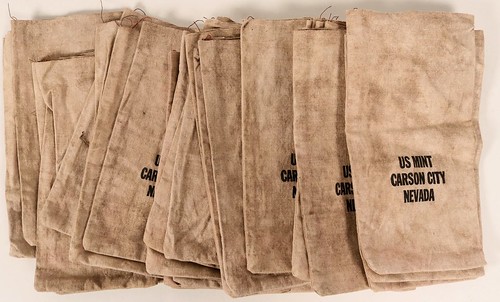
Thirty cloth bags "US MINT/ CARSON CITY/ NEVADA" all 6 x 11", soiled, probably made after 1970. Great bag for retail use or for any Nevada or coin collector! State: Nevada City: Carson City Date:
Too bad these aren't original bags - but still a neat item. -Editor
To read the complete lot description, see:
Carson City Mint Cloth Bags (30) #110654
(https://holabirdamericana.liveauctiongroup.com/Carson-City-Mint-Cloth-Bags-30-110654_i35013963)
Lot 4345: US Coin Scale
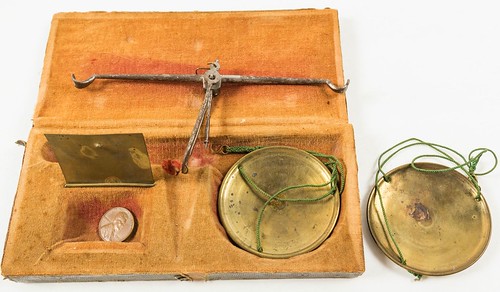
Early dark brown covered wood box (lined in velvet), embossed with a US American Eagle on the top in guilt. Brass scale with opening especially for small weights, which are not present. No manufactures name. Box measures 3.25 x 6.5". Front closure broken. Circa 1850. State: City: Date:
A classic balance scale. Start a collection! -Editor
To read the complete lot description, see:
US Coin Scale #55172
(https://holabirdamericana.liveauctiongroup.com/US-Coin-Scale-55172_i35014089)
Lot 4545: Book - Troemner Scales, Balances and Weights
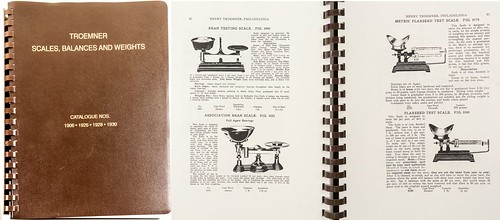
Troemner Scales, Balances and Weights, catalog nos. 1906, 1926, 1928, 1930. New spiral binding, 11.25" x 9.25". Copy of original, by the International Society of Antique Scale Collectors, Chicago, Illinois, January, 1996. Great illustrations! Henry Troemner, 1810-1873. State: Illinois City: Chicago Date:
For scale collectors, here's a reprint of a manufacturer's catalog produced by the International Society of Antique Scale Collectors. -Editor
To read the complete lot description, see:
Troemner Scales, Balances and Weights #57848
(https://holabirdamericana.liveauctiongroup.com/Troemner-Scales-Balances-and-Weights-57848_i35014289)
Lot 4459: Nugget Cigar Store Cardboard Tokens
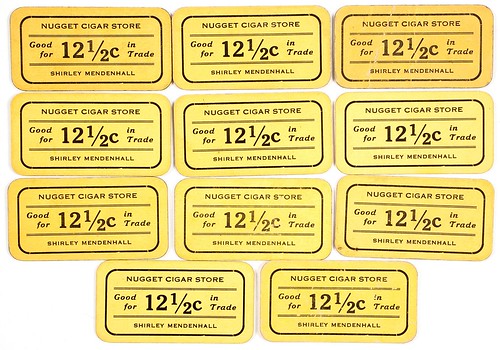
11 tokens: Nugget Cigar Store / GF 12 1/2 c IT / Shirley Mendenhall. Yellow cardboard. State: Idaho City: Weiser Date:
Attractive little tokens in an unusual denomination for the period. -Editor
To read the complete lot description, see:
Nugget Cigar Store Cardboard Tokens #38619
(https://holabirdamericana.liveauctiongroup.com/Nugget-Cigar-Store-Cardboard-Tokens-38619_i35014203)

NUMISMATIC NUGGETS: DECEMBER 1, 2019
Here's a selection of interesting or unusual items I came across in the marketplace this week. Tell us what you think of some of these. -Editor
Sicily, Siculo-Punic Silver Tetradrachm
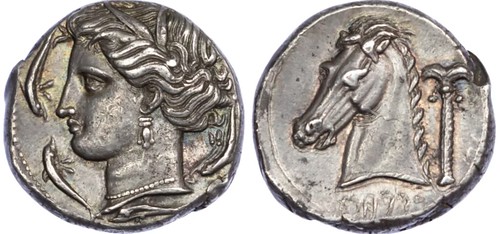
Sicily, Siculo-Punic (c. 320-300 BC)
Silver Tetradrachm
Obverse: Head of Tanit-Persephone facing left, surrounded by three dolphins.
Reverse: Horse's head facing left, palm tree with two clusters of dates behind, Punic legend ‘MMHNT' below.
This impressive silver tetradrachm was probably struck at the Siculo-Punic mint of Entella, and bears the inscription ‘MMHNT', translating to ‘People of the Camp', implying these coins were issued to pay troops fighting for Carthage. These tetradrachms coincide with a period of turmoil in Sicily, stemming from the assault of Agathokles, the Tyrant of Syracuse, on Carthaginian territories in 311 BC. Carthage responded with a massive military campaign and took back almost all the island by 310 BC, eventually laying siege to Syracuse. As a last resort Agathokles launched a counterattack on the city of Carthage itself (a tactic the Romans would use to great effect during the Second Punic War a century later). In a foreshadowing of history, the Carthaginians were forced pull back their army to defend the homeland, but in this case, they were successful. Agathokles retreated to Sicily with a bloody nose in 307 BC, and after peace treaties, permitted to keep control over Syracuse.
Nice horsie. Usually they are seen beneath a rider or in front of a vehicle. It's not often you see a full portrait of a horse's head on a coin. From Baldwin's. -Editor
To read the complete item description, see:
SICILY, SICULO-PUNIC, SILVER TETRADRACHM
(https://www.baldwin.co.uk/product/sicily-siculo-punic-silver-tetradrachm-2/)
1622 Ferdinands II Reichstaler
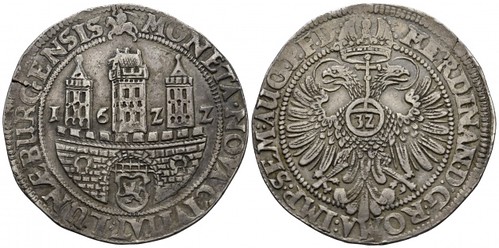
Reichstaler (32 shillings) 1622, with title Ferdinands II. 29.57 g. Dav. 5466; Mader 499d.
Of great rarity. Fine patina, small Schrötlingsriss, very nice + With reference to the coin reform (with PFD).
From the upcoming Fritz Rudolf Künker sale. -Editor
To read the complete lot description, see:
Reichstaler (32 shillings) 1622, Dav. 5466; Mader 499d.
(https://www.kuenker.de/en/elive-auction/stueck/246570)
"Sign Of The 8" Civil War Token
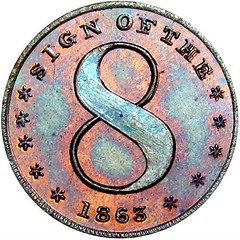
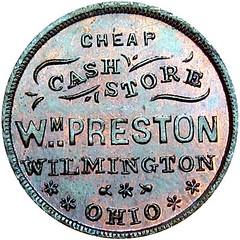
348 - OH935C-1a R5 Raw MS64 30% Red. Wm. Preston Cheap Cash Store, Wilmington Ohio with Sign Of The 8 reverse die 1347. A NGC MS63 RB sold for $565 in our January 2015 sale. (500-750)
Unusual obverse design - "sign of the 8". I wonder what that meant. From the upcoming Steve Hayden sale. -Editor
To read the complete lot description, see:
348 - OH935C-1a R5 Raw MS64 Wilmington Ohio Civil War token
(https://www.civilwartokens.com/Event/LotDetails/2774938/348-OH935C1a-R5-Raw-MS64-Wilmington-Ohio-Civil-War-token)
Numismatic Convention Badges & Ribbons
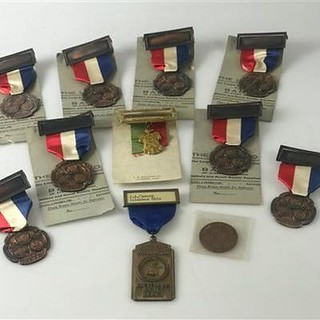 NUMISMATIC CONVENTION RIBBONS AND TOKENS ~ 1963 TORONTO TOKEN, ANA CLEVELAND "1934" NUMISMATIC CLUB MEDAL/RIBBON, AND EIGHT 1938 AMERICAN NUMISMATIC ASSOCIATION ANNUAL CONVENTION MEDALS/RIBBONS (SOME ON CARDS)
NUMISMATIC CONVENTION RIBBONS AND TOKENS ~ 1963 TORONTO TOKEN, ANA CLEVELAND "1934" NUMISMATIC CLUB MEDAL/RIBBON, AND EIGHT 1938 AMERICAN NUMISMATIC ASSOCIATION ANNUAL CONVENTION MEDALS/RIBBONS (SOME ON CARDS)
Great numismatic history and a popular collectible. -Editor
To read the complete lot description, see:
NUMISMATIC CONVENTION RIBBONS AND TOKENS
(https://www.barnebys.com/auctions/lot/numismatic-convention-ribbons-and-tokens-BiKnU0RsSc3)

ROYAL MINT UNVEILS ITS LARGEST COIN EVER
We live in an age of superlatives. This article from The Independent discusses the new jumbo-size coin from the Royal Mint, a commemorative honoring coin designer William Wyon. -Editor
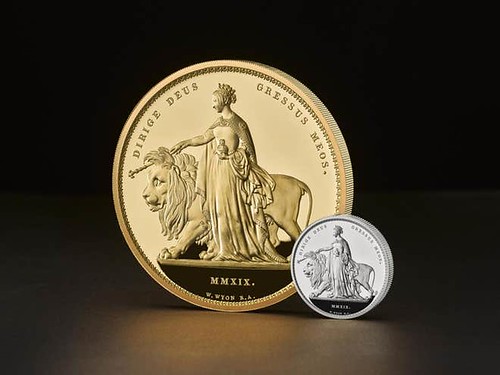
The Royal Mint has launched its largest coin ever, a creation that measures 175mm in diameter, weighs 5kg and has a denomination of £5,000.
The coin has been created as part of The Royal Mint's new Great Engravers series, which pays homage to artists who have worked on British coinage.
The first artist to be recognised for the series is William Wyon, who was chief engraver at The Royal Mint for 23 years until his death in 1851.
Wyon is well-known for his Una and the Lion design, which is featured on the coin.
The design was first featured on a £5 gold coin in 1839 to commemorate the beginning of Queen Victoria's reign two years prior.
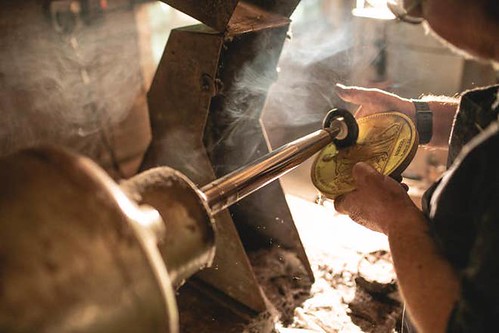
The 5kg coin, of which only one was made, has already been sold to an unknown buyer and is the largest coin The Royal Mint has ever produced in its history.
The 2kg coin, of which there are four, has a 150mm diameter and has a denomination of £2,000.
The original die used almost two centuries ago had to be digitally scanned and lasers were later used to cut the design onto the coin, before it was hand polished.
The Una and the Lion coin is available to purchase from The Royal Mint website in a variety of finishes, with prices starting from £180.
To read the complete article, see:
ROYAL MINT UNVEILS LARGEST COIN EVER WEIGHING 5KG
(https://www.independent.co.uk/life-style/royal-mint-largest-coin-ever-gold-great-engravers-series-william-wyon-a9216491.html)
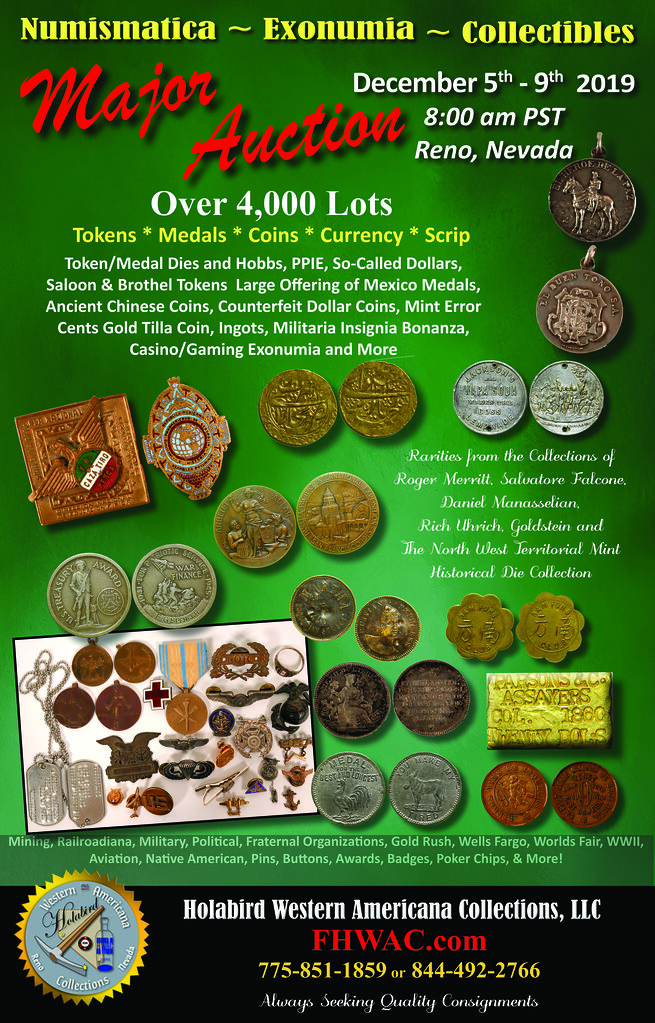
COPERNICUS'S TREATISE ON MONEY
Gosia Fort submitted this article on Nicolas Copernicus as a numismatist and his famous treatise on money. Thanks! -Editor
Earlier this fall I gave a presentation on Mikolaj Kopernik (Nicolas Copernicus) as numismatist to the Western Pennsylvania Numismatic Society. Copernicus is probably one of the most famous Poles, known to the world as the astronomer and the author of the work on the heliocentric theory of the world De revolutionibus orbium coelestium (On the Revolutions of the Heavenly Spheres). However, his skills and interests went beyond astronomy. He was a man of the Renaissance, fluent in many languages, with degree in canon law, who also was a physician, translator, artist, scholar, economist, mathematician and diplomat.
He wrote several works dealing with economics and finance, but none of them were published during his life time. My talk focused on Copernicus's treatise on money, of which three different versions are known. No originals survived. All of them are known only from the later copies. The earliest version Meditata (1517) includes the idea that bad money is driving out good money. Later this monetary principle – known as Gresham Law – was popularized by the English merchant and named after him. Not many people know though, that when Copernicus formulated the idea that bad money is driving out good money Thomas Gresham has not been born yet. The second version,
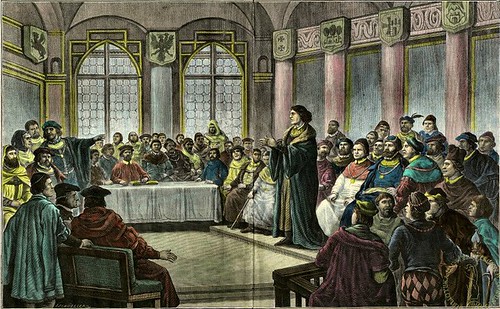
19 cent. Drawing by Johan Schübeler of Copernicus presenting in Grudziadz
The final version Monete cudende ratio (On the minting of coin, 1526) presented quite a detailed analysis of the debasement process in relation to Prussian coinage and added a new passage in which he stated that the relation between the nominal price (face value) of silver and gold coins should be identical with the price of pure silver and gold. For more information I refer everyone to an excellent website on Copernicus created at the University of Torun, especially to the section on economics prepared by Leszek Zygner
http://copernicus.torun.pl/en/science/economics/
I illustrated this talk with medals and coins from my collection which directly refer to Copernicus's presentation in Grudziadz or his treatise on money:
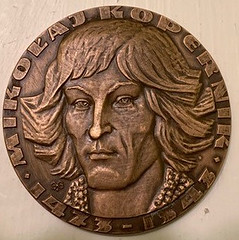
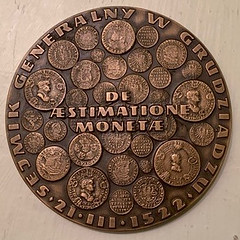
1972 – Bronze medal commemorates the Assembly in Grudziadz on the 450 anniversary of the Copernicus visit to this city. The artist Edward Gorol included in his design Polish coins of the period and the title of the work (De aestimatione monetae also known as Meditata).
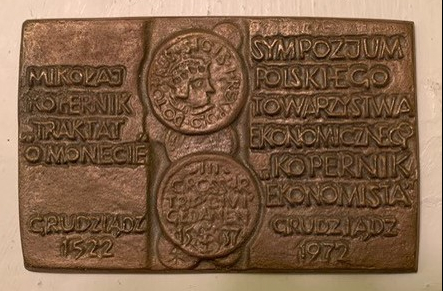
1972- One-sided bronze plaquette struck for the Symposium of Polish Economics Society devoted to Copernicus as economist and held in Grudziadz 1972 to celebrate 450 anniversary of Copernicus giving his presentation on money.
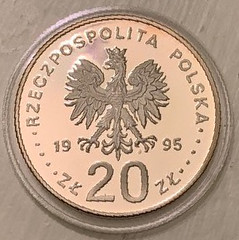
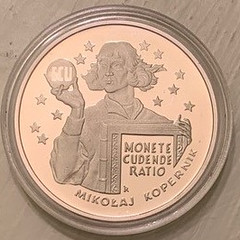
1995 - 20 ZL silver coin designed by Robert Kotowicz with obvious references to Copernicus economic interest: Copernicus is holding the ECU coin in one hand and his book on coinage in the other
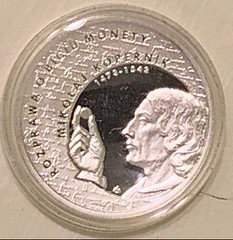
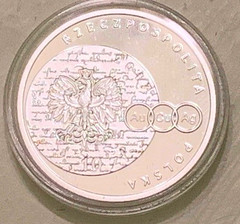
2017 - 10 ZL silver coin designed by Sebastian Mikolajczak with Copernicus examining a coin, the common title (Treatise on money) spelled out on left and the manuscript of his treatise in the background.
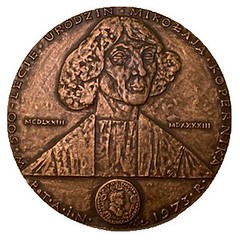
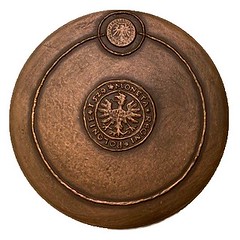
1973 – Bronze medal issued by Polish Society of Archeologists and Numismatists to celebrate 500 anniversary of Copernicus birth recognizing his contribution to the study of coins by including images of the coins from the period.
I added also several medals with Copernicus issued by different numismatic societies, events, exhibits or collections, and ended with images of medals from my wish list, which are also tied to Copernicus and his interest in money.
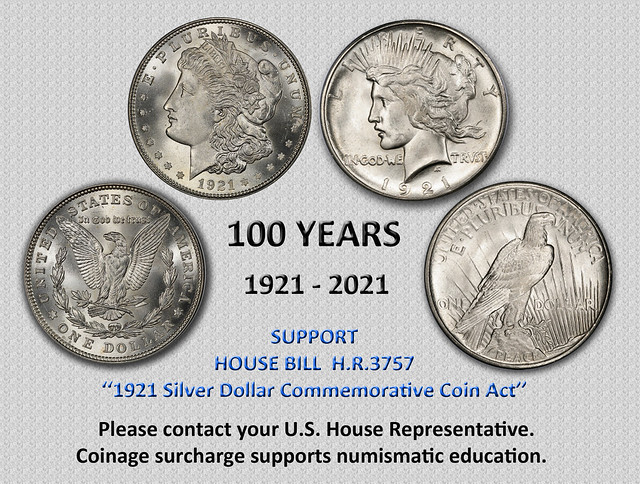
LITHUANIA ISSUES VILNA GAON COMMEMORATIVE COIN
Aaron Oppenheim passed along this Jerusalem Post article about a new Lithuanian Euro coin. Thanks. -Editor
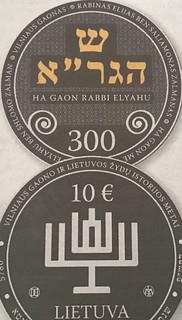 Lithuania is going to release a special commemorative 10-Euro-coin honoring the great Jewish sage Rabbi Elijah ben Solomon Zalman, better known as the Vilna Gaon or the Gra, on the occasion of the 300th anniversary of his birth.
Lithuania is going to release a special commemorative 10-Euro-coin honoring the great Jewish sage Rabbi Elijah ben Solomon Zalman, better known as the Vilna Gaon or the Gra, on the occasion of the 300th anniversary of his birth.
According to the website of the Bank of Lithuania, the coin will weigh about 23 grams, be made out of silver and will be minted in the country.
It is scheduled to be released in the second quarter of 2020. The event will also mark the first time that a Euro coin features Hebrew letters.
The letter shin – which, according to gematria, has a numerical value of 300 - will be carved on one side of it, alongside with the acronym hei-gimel-resh-alef, indicating Ha-Gaon-Rabbi-Eliahu. A stylized Torah scroll with the number 300 will complete the decorations.
On the other side, the coin will carry the design of a menorah, as well as the Hebrew year, 5780, both in numbers and in letters. Moreover, its border will feature an inscription in Hebrew and Lithuanian reading: "The year of the Vilna Gaon and the history of the Jews of Lithuania."
The Vilna Gaon was born in April 1720. He was the leader of the community and one of the greatest Torah scholars of all times. As it is pointed out on the website of Yad Vashem, under his leadership, Vilna became known as the "Jerusalem of Lithuania."
To read the earlier E-Sylum article, see:
Lithuania to release Euro coin honoring the Vilna Gaon
(https://www.jpost.com/Diaspora/Lithuania-to-release-Euro-coin-honoring-the-Vilna-Gaon-608532)
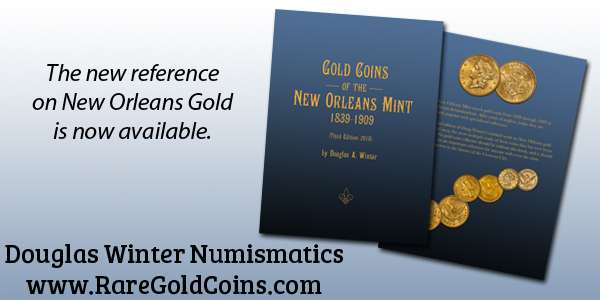
EDWARD RUMSEY ROYAL ACADEMY OF ARTS GOLD MEDAL
An article by Jay Turner published November 14, 2019 on the PCGS web site discusses a rare gold medal issued by the Royal Academy of Arts. -Editor
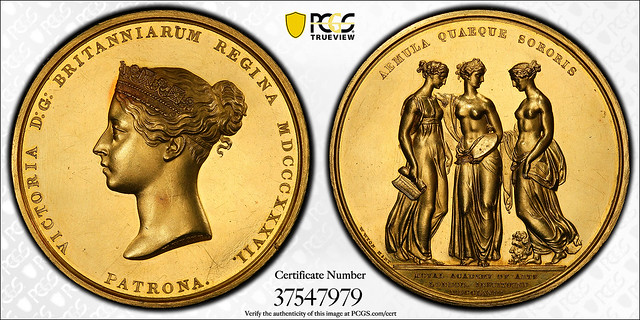
While Rumsey did have a long and successful architectural career, with impressive buildings to his credit, the accolade for which he was most famous, the Gold Medal from the Royal Academy of Arts, was from architectural drawings for a cathedral that was never constructed.
Rumsey received his architectural training by studying under the great 19th-century English architect Gilbert Scott. In 1847 at the age of 23, Rumsey submitted drawings for a Gothic cathedral to the Royal Academy of Arts that were deemed so excellent that he was awarded the Academy's Gold Medal. But even with this prestigious prize and acclaim that went with it, Rumsey found little professional success. He decided to move to Australia in hope that there would be more opportunity to earn commissions for his work.
In 1861, gold was discovered in Otago in the Southern Island of New Zealand, touching off a gold rush that drew miners from as far away as California. Rumsey was one of the many Australians who would pull up stakes and head for the gold fields of this island colony. Rumsey settled in the city of Dunedin. Soon thereafter, Rumsey submitted a design for the Government House which was to be constructed in New Zealand's largest city, Auckland. Rumsey won an award for his design but, like his design for the Gothic cathedral in England, that never came to fruition. So, too, did his submission for the Government House fail, and someone else received the work.
The Gold Medal from the Royal Academy was the only such medal awarded in 1847. The medal, designed by W. Wyon and dated 1837, was struck at the Royal Mint and features a bust of Queen Victoria. The reverse features the three graces of architecture, painting, and sculpture. The medal is referenced today in British Historical Medals as BHM-1795 and in Eimer as E-13068. The medal weighs 120.13 grams, and its precious metal value represented a significant amount of money in 1847 as it is today. Given that, it is amazing the medal still exists today.
To read the complete article, see:
PCGS Certifies Edward Rumsey's Medal
(https://www.pcgs.com/news/pcgs-certifies-edward-rumseys-medal)
GEORGE WASHINGTON SILVER FUNERAL MEDAL
Allan, Marnie, & Lief Davisson's current E-Auction includes an interesting silver Washington Funeral medal. Here's a write-up from their November 27, 2019 email. -Editor
George Washington Silver Funeral Medal
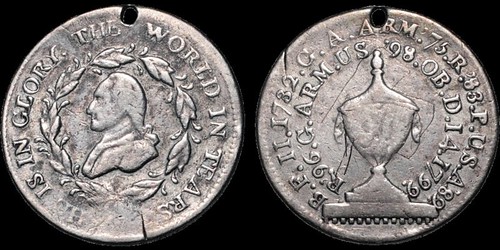
George Washington died on December 14th, 1799. He was 67 years old. Our current auction, which happens to close 3 days before the 220th anniversary of his death, includes a fascinating piece of Americana: one of his funeral medals.
Washington was much beloved, and these medals were worn in homage to him in civic processions shortly after his death. Musante (author of Medallic Washington, the two volume standard reference on Washington medals published in 2016) notes that "two of the largest and most widely reported processions were held in Boston," one on Thursday, January 9, 1800, by the citizenry, and the second on February 11, Washington's birthday, conducted by the Grand Lodge of Massachusetts (Washington's birthday was technically moved to the 22nd following Britain's adoption of the Gregorian calendar in 1752, but the original Julian calendar date was the 11th). Virtually all examples were holed to allow them to be worn. This piece, as do others in the series, shows wear, suggesting that the owners kept them and wore them or carried them in their pockets long after the funeral.
We assembled E-Auction 33 before we know how extensive the sale in Baltimore of Washington medals from the Historical Society of Pennsylvania would be. That auction included seven different Boston funeral medals. Two were the very rare skull and crossbones type. Both realized well into the $30,000 range. The sale offered five of the urn reverse type, two in silver and three in white metal. The silver pieces sold for $20,400 and $9,600. The three white metal pieces sold for prices in the low to mid $4000 range.
Musante lists a total of 12 obverse-reverse die combinations of this medal. The seven in the Baltimore sale were all different. The lot in our sale differs from those in that sale and is the only die combination that is found only in silver. The most distinctive characteristic of the lot we have is on the reverse where the date actually runs into the base of the urn.
If you would like more information on this historic piece, please get in touch.
To read the complete lot description, see:
E-Auction 33 Lot 202 UNITED STATES. George Washington.
(https://davcoin.com/lot/e-auction-33-lot-202?utm_source=Davissons+Ltd&utm_campaign=9945ac2803-george-washington-e33)
To browse Davissons' E-Auciton 33, see:
https://davcoin.com/sale/E-Auction%2033
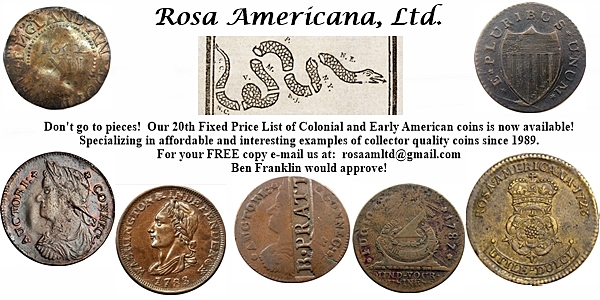
GHANA ISSUES NEW BANKNOTES AND TWO CEDI COIN
Ultramodern numismatist Pabitra Saha forwarded this article from Ghana about that country's new coin and banknotes. Here's an excerpt. -Editor
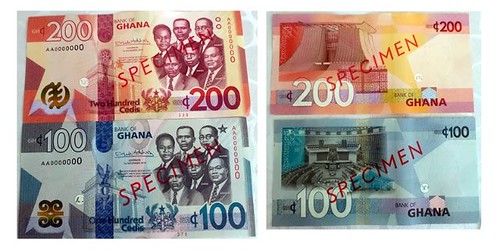
The Governor of the central bank, Dr Ernest Yedu Addison, has announced the introduction of ¢100 and ¢200 notes to the country's currency denomination.
Also, ¢2 coins have been introduced.
The new notes which go into circulation Friday were unveiled at a press conference at the Banking Hall of the Bank of Ghana (BoG).
"We need banknotes and coins that are convenient for most people to use, high quality, secure and cost-effective. Accordingly, in March 2017, the Bank of Ghana begun a process of conducting a thorough review of the structure of the currency including on the note/coin boundary and acceptability and use of the individual currency series," Dr Addison said.
He said the review exercise which involved conducting a nationwide survey with market operatives, businesses and international stakeholders as well as some empirical exercise.
"These new higher value denominations will only restore partially the dollar value of the higher denomination GH¢200 to about US$40, not quite close to levels in 2007, but high enough to significantly reduce the deadweight burden and high transaction cost in making high-value purchases in a cash-based economy like Ghana," he said.
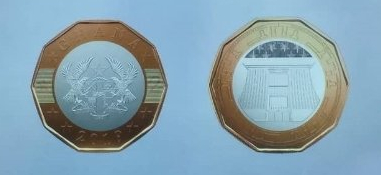
To read the complete article, see:
Central Bank introduces ¢100, ¢200 notes and ¢2 coin
(https://www.myjoyonline.com/business/2019/november-29th/central-bank-introduces-gh100-gh200-notes-and-gh2-coin.php)
THE BOOK BAZARRE
CHRISTINE LAGARDE SIGNS EURO BILLS
This short Associated Press story shows new European Central Bank president Christine Lagarde adding her signature to the euro banknotes. -Editor
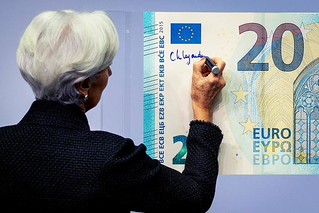 The new president of the European Central Bank has added her signature to euro banknotes, which she describes as "the most tangible symbol of European integration."
The new president of the European Central Bank has added her signature to euro banknotes, which she describes as "the most tangible symbol of European integration."
Christine Lagarde signed the euro bills in a brief ceremony Wednesday at the ECB's Frankfurt headquarters, a few weeks after embarking on her eight-year term as the bank's fourth president.
Every euro banknote bears the signature of the institution's president. Most currently in circulation carry that of Mario Draghi, whose term ended last month.
She said that 23 billion banknotes are in circulation - worth 1.26 trillion euros ($1.39 trillion), one-third of which is being used outside the 19-nation eurozone.
To read the complete article, see:
New ECB Boss Lagarde Adds Her Signature to Euro Banknotes
(https://www.usnews.com/news/business/articles/2019-11-27/new-ecb-boss-lagarde-adds-her-signature-to-euro-banknotes)

BANKNOTE PRINTER DE LA RUE IN TROUBLE
Dick Hanscom forwarded this BBC News article about banknote printer De La Rue's financial troubles. Thanks. -Editor

De La Rue, the company that prints the UK's banknotes, has said there is a risk that the firm will collapse if its turnaround plan fails to work.
The announcement came as it suspended its dividend and reported a loss in the first half of its financial year.
De La Rue said its warning was based on a worst-case scenario.
However, it concluded that there was "a material uncertainty that casts significant doubt on the group's ability to operate as a going concern".
UK-based De La Rue prints cash for about 140 central banks and employs more than 2,500 people globally.
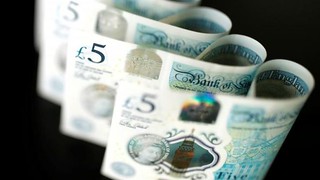 All current Bank of England banknotes are printed by the firm at a site in Debden, Essex.
All current Bank of England banknotes are printed by the firm at a site in Debden, Essex.
It is unclear what would happen if the firm got into difficulties, but it is likely that a rival would take over its Bank of England contract. Its main competitors are all based outside the UK.
De La Rue has faced some big setbacks in the past two years, including the loss of the post-Brexit UK passport printing contract to a Franco-Dutch firm last year.
In May last year, it had to write off £18m after Venezuela's central bank failed to pay its bills.
It began producing banknotes in 1860, first for Mauritius and then elsewhere. Today it produces enough notes each week that if stacked up would reach the peak of Everest twice.
Its main competitor, German company Giesecke & Devrient, produces notes for roughly 100 central banks, while the Canadian Banknote Company and US-founded Crane Currency are also major players.
To read the complete article, see:
UK banknote printer De La Rue fears for its future
(https://www.bbc.com/news/business-50557097)
A number of publications had fun with their headlines. The Washington Post ran a Bloomberg article with the headline, "The World's Biggest Banknote Printer Is Running Short of Money". -Editor
To read the complete article, see:
The World's Biggest Banknote Printer Is Running Short of Money
(https://www.washingtonpost.com/business/the-worlds-biggest-banknote-printer-is-running-short-of-money/2019/11/26/41e480b2-1050-11ea-924c-b34d09bbc948_story.html)
LATIN DICTIONARY COMPILERS REACH LETTER R
Bibliophiles will appreciate the effort and tenacity of German researchers working to complete a comprehensive dictionary of the Latin language. From the NYT News Service, seen on Art Daily. -Editor
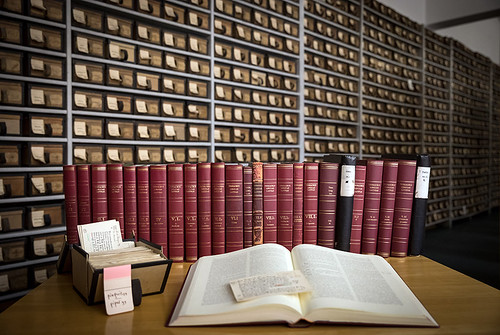
When German researchers began working on a new Latin dictionary in the 1890s, they thought they might finish in 15 or 20 years.
In the 125 years since, the Thesaurus Linguae Latinae (TLL) has seen the fall of an empire, two world wars and the division and reunification of Germany. In the meantime, they are up to the letter R.
This is not for lack of effort. Most dictionaries focus on the most prominent or recent meaning of a word; this one aims to show every single way anyone ever used it, from the earliest Latin inscriptions in the sixth century B.C. to around A.D. 600. The dictionary's founder, Eduard Wölfflin, who died in 1908, described entries in the TLL not as definitions, but "biographies" of words.
The first entry, for the letter A, was published in 1900. The TLL is expected to reach its final word — "zythum," an Egyptian beer — by 2050. A scholarly project of painstaking exactness and glacial speed, it has so far produced 18 volumes of huge pages with tiny text, the collective work of nearly 400 scholars, many of them long since dead. The letters Q and N were set aside, because they begin too many difficult words, so researchers will have to go back and work on those, too.
"Its scale is prodigious," David Butterfield, a senior lecturer in Classics at Cambridge, said in an email, adding that when the first publication appeared in 1900, "it did not go unnoticed that the word closing that installment was ‘absurdus.'"
It's a monumental effort aimed at a small group of classicists, for whom the ability to understand every way a word was used is important not only for reading literature, but also understanding language and history.
To read the complete article, see:
Latin dictionary's journey: A to Zythum in 125 years (and counting)
(https://artdaily.cc/news/118852/Latin-dictionary-s-journey--A-to-Zythum-in-125-years--and-counting-#.XePYYehKhPY)
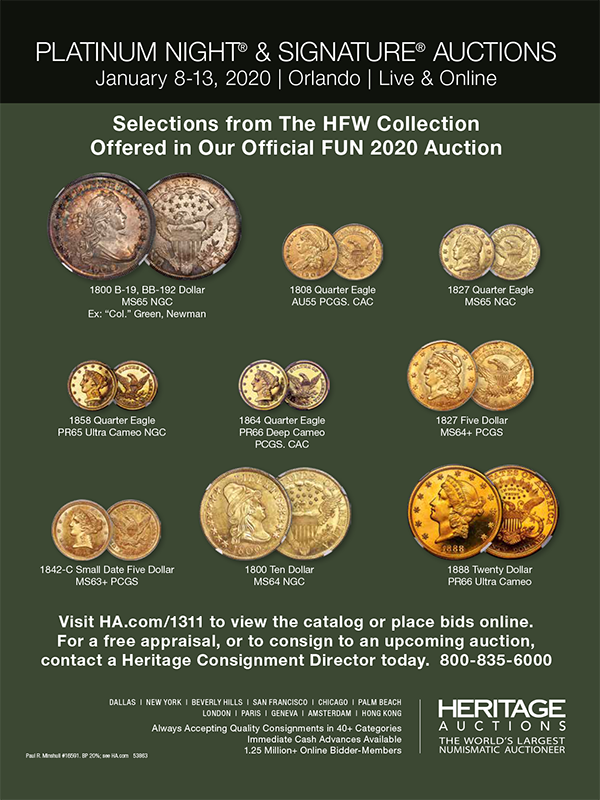
LOOSE CHANGE: DECEMBER 1, 2019
Here are some additional items in the media this week that may be of interest. -Editor
Bad Coin Behavior
Len Augsburger forwarded this report of "bad coin behavior" from West Peoria. Thanks. -Editor
Told he was short on his purchase by a penny, a convenience-store customer yelled at employees and threw coins at them.
Just before 4 a.m. Nov. 17, a man entered the Casey's General Store at 2114 W. Farmington Road. The man, about 50 years of age, went to the check-out counter and handed over coins to cover a purchase, according to a Peoria County sheriff's report. The report did not specify the purchase.
However, the shopper "became agitated when he was told that the change he had used to pay for his purchase was short by a penny," the report stated.
When the cashiers "insisted he pay the remaining money, " he "grew angrier" and threw his coins at them, the report stated.
The shopper headed toward the exit, but stopped and began yelling at the employees, the report stated. He said "something to the effect of ‘You think this is funny?'" the report stated.
Plenty of stores these days can't be bothered to take in or pay out cent coins. But it's not universal. At a Fuddrucker's with my family this week I paid cash but came up two cents short and asked if they'd be willing to take it (with the alternative being changing a larger bill or using a credit card). The cashier said she couldn't do it, but a fellow employee reached into the tip jar for the appropriate coins. I protested, but he said "I leave them in the jar anyway."
A few weeks back I stopped in a 7-11 and the woman in front of me was paying for a pack of cigarettes with a big pile of change, which the clerk was dutifully counting. She came up short, but he let her have her purchase and be on her way. I spotted a silver dime on the counter and asked if I could look at it. I gave him a quarter just for fun because it had been so long since I'd seen one in the wild. It was a 1962-D. -Editor
To read the complete article, see:
Short by penny, irate shopper throws coins at Casey's employees
(https://www.pjstar.com/news/20191127/short-by-penny-irate-shopper-throws-coins-at-caseys-employees)
Video: World War II Vet Receives Medals 70 Years Late
Here's a nice video from the Detroit news about a WWII veteran receiving medals. -Editor
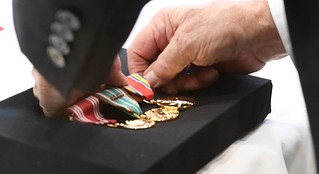 Henry Kroll was awarded the World War II Campaign Medal with four Bronze Stars, an Army Good Conduct Medal and a WWII Victory Medal
Henry Kroll was awarded the World War II Campaign Medal with four Bronze Stars, an Army Good Conduct Medal and a WWII Victory Medal
To watch the complete video, see:
World War II veteran receives medals 70 years late
(https://www.detroitnews.com/videos/news/local/michigan/2019/11/14/world-war-ii-veteran-receives-medals-70-years-late/4196071002/)
TIFFANY AND THE GREAT SEAL OF THE U.S.
Arthur Shippee forwarded this New York Times article on the history of Tiffany. It includes a numismatic connection - here's an excerpt. -Editor
Once upon a time, Tiffany was the name of a person: Charles Lewis Tiffany, who, along with John B. Young, opened a "stationery and fancy goods store" on Broadway in 1837. Over the next 182 years, as the original store moved uptown to Fifth Avenue, and then expanded to over 300 locations, the name transformed into something else entirely: a symbol of striving aspiration, whether it be for love or a more lavish, gleaming life. The name Tiffany became an expression of the American promise of a better future — part of the national myth, captured in the plushy environs of a little blue box.
It has touched everything from the White House to the Super Bowl to the $1 bill, to literature, film and television.
Louis Comfort Tiffany, the founder's son, took over in 1902. He had been Tiffany's first art director, and was so well known for his art nouveau style — embodied by the "Tiffany lamp" — that President Chester Arthur asked him to redecorate the White House in 1882. His father, Charles Lewis Tiffany, soon invented the "Tiffany setting" for diamond rings: Instead of framing the stone with bezels on either side, it displayed the gem solo atop a band. And thus was the modern engagement ring born.
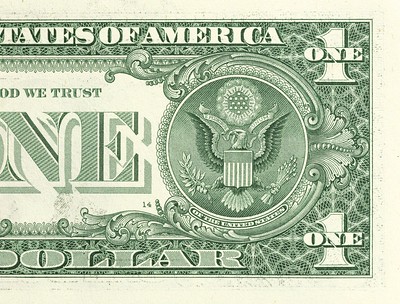
In 1885 Tiffany was responsible for the redesign of the Great Seal of the United States, which made the previously long and skinny eagle's legs more muscular, apparently to match the country's muscular ambitions. The design is still on the back of the currency.
Blake Edwards's 1961 film "Breakfast at Tiffany's," starring Audrey Hepburn and based on the 1958 novella by Truman Capote, seared the Tiffany name into the popular imagination.
Since the 1860s Tiffany has had a somewhat unexpected sideline in … sports trophies. Aside from the seven-pound Vince Lombardi Super Bowl trophy, which Tiffany created in 1967, the company also makes the silver cup for the United States Open tennis championships, the silver tray presented to the New York City Marathon winner, and the Belmont Stakes cup, among many others. Oh — and Tiffany designed the interlocking "NY" logo that became the inspiration for New York Yankees branding.
To read the complete article, see:
Tiffany Is More Than a Store
(https://www.nytimes.com/2019/11/28/business/tiffany-history.html)
FEATURED WEB PAGE: COINS IN HONG KONG
This week's Featured Web Page is on the history and evolution of coins in Hog Kong by the Hong Kong Monetary Authority. Be sure to click the "Expand All" button to see the images.
1864
The first Hong Kong coins denominated in 1 mil, 1 cent and 10 cents are issued
Hong Kong's own coinage appears for the first time. They include 10-cent coins minted in silver, as well as 1-cent and 1-mil coins struck in bronze. 1 mil is equivalent to one-thousandth of a dollar. During those days, 1 mil can pay for a simple breakfast, such as a bowl of porridge with a fritter, a bowl of wonton noodles or a piece of bread. The Chinese expression of "not worth a mil" is used to describe things that are worthless.
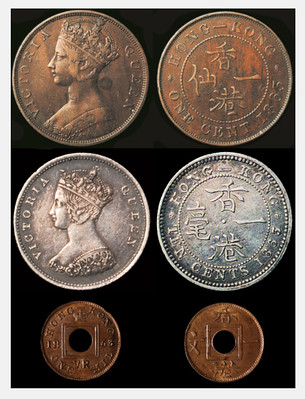
www.hkma.gov.hk/eng/key-functions/money/
hong-kong-currency/money-past-and-present/history-
and-evolution-of-coins-in-hong-kong/

